#Mining World Russia 2022
Video
Demining in Ukraine.
#2022 russian invasion of ukraine#2022 russia-ukraine news#ukraine#russia#mine#land mine#demining#war#world at war#weapons
25 notes
·
View notes
Text
While most Ukrainians battled against Germany during the war, it’s well known that the western region of the country collaborated with the Third Reich — and that thousands of those involved were allowed to resettle in Canada. [...]
When Anthony Rota, [...] introduced Hunka during Zelenskyy’s Sept. 22 visit, he called him a “veteran from the Second World War who fought for Ukrainian independence against the Russians and continues to support the troops today.”
And Hunka made the argument himself after Russia invaded his homeland last year. “In the last war, I joined the Ukrainian underground to fight Russia, so I was fighting the same people they’re fighting now,” he told a reporter covering a peace vigil in North Bay, Ontario, in March 2022.
“Nothing has changed there. The same enemy. First Stalin was there and now this idiot,” he said, referring to Russian President Vladimir Putin. [...]
In a post for the SS Galichina veterans’ blog Combatant News, Hunka wrote that 1941 to 1943 — after Germany invaded Ukraine and before Hunka enlisted — were the happiest years of his life. He also recalled eagerly awaiting “the legendary German knights” to come and attack “the hated Poles,” using a slur for Polish people, in 1939.
Captioned photos from the blog show Hunka during SS artillery training in Munich in December 1943 and in Poland around the time of a visit by Nazi mastermind Heinrich Himmler. “I know that if I ordered you to liquidate the Poles … I would be giving you permission to do what you are eager to do anyway,” Himmler said during that visit, according to several historical accounts.
Now, the Polish minister of education is looking into whether Hunka can be extradited and prosecuted for what happened during the war.[...]
[After the war,] Hunka made his living in the aircraft industry, working his way up to inspector at DeHavilland Aircraft in Toronto. After retirement, he visited Ukraine nearly every year, according to a profile of him in a University of Alberta newsletter announcing the donation made in his honor by his sons. The profile said he also served as president of the parish council of St. Volodymyr Ukrainian Catholic Church in Thornhill, Ontario.[...]
In his mea culpa, Rota made it sound like Hunka was a constituent from his district [...] whom he did not know much about. “This initiative was entirely my own,“ Rota said[...]
But Rejean Venne, an independent Canadian journalist, wrote in his Substack newsletter this week that Rota and Hunka family members have had numerous chances to cross paths over the years. Among Venne’s examples:
- One of Hunka’s sons, Martin, was chief financial officer of Redpath Mining, a multinational corporation headquartered in Rota’s district. Redpath has contributed to Rota’s campaigns and Rota has provided government funding for recreational facilities operated by Redpath. (The company did not respond to inquiries from the Forward made Thursday.)
- Martin Hunka has also served as chair of the board of trustees for North Bay Hospital, which is located in Rota’s district and which Rota has supported. Hunka’s name can no longer be found on the hospital’s website and social media posts. (The hospital did not respond to a request for comment emailed Thursday.)
- North Bay Pride, an LGBTQ+ organization, gave an award to Rota nine months after Yaroslav’s granddaughter Leshya Lecappelain joined its board of directors. In 2022 and 2023, North Bay Pride received more than $100,000 in funding from Rota. (Asked about this, a spokesperson for North Bay Pride said Lecappelain had not been on its board for several years.)
“Rota’s response that this was a last-minute request doesn’t add up,” Venne said in an email interview. “The Hunka family appears well connected in Rota’s district.”
The Forward could not determine whether Hunka and Rota met before he was honored at Parliament. Rota and others at the House of Commons did not respond to several requests for comment sent Wednesday and Thursday.
Efforts to reach Yaroslav, Martin and Peter Hunka, Lecappelain and other members of the family for comment were also unsuccessful.[...]
On Wednesday, the University of Alberta said it would return the CA$30,000 endowment that Hunka’s sons donated in 2019 in their father’s honor. The money was intended to fund research at the school’s Canadian Institute for Ukrainian Studies.
But Per Anders Rudling, a university alumnus and expert on Ukrainian nationalism who teaches at Sweden’s Lund University, said the Hunka fund is just “the top of an iceberg.”
In an email to the Forward, Rudling said the University of Alberta has “much larger endowments” honoring other figures connected to the Waffen SS unit. The “most problematic,” he said, is the Volodymyr and Daria Kubijovych Memorial Endowment Fund [Editors note: archive link - also "matched two-to-one by the Government of Alberta"] At CA$450,000 — about $334,000 — it’s 15 times larger than the Hunka fund the university is returning.[...]
In a Facebook post Thursday, Rudling also questioned university endowments named for other Galichina Division veterans, including Roman Kolisnyk, Levko Babij and Edward Brodacky.
Pointing to research he published in The Journal of Slavic Military Studies [Editors note: 1, 2], Rudling said, “I have tried to raise this issue in the past, to no avail.”
Asked about Rudling’s concerns, Michael Brown, a spokesperson for the University of Alberta, reiterated a statement in which interim provost Verna Yiu said the school is “reviewing its general naming policies and procedures, including those for endowments, to ensure alignment with our values.” Yiu also expressed the school’s “commitment to address anti-Semitism in any of its manifestations, including the ways in which the Holocaust continues to resonate in the present.”
The honors given to SS Galichina fighters extend beyond academia. One of the University of Alberta’s endowments is for its former chancellor Peter Savaryn, another SS Galichina member. In 1987, Savaryn was awarded the Order of Canada, among the nation’s highest honors, bestowed by Canada’s governor general, the representative of the British Crown. Mary Simon, the current governor general, has condemned the Hunka scandal as “a shock and an embarrassment.”[...]
When the Hunka endowment was announced in 2020, the university said it would fund research on two “leaders of the underground Ukrainian Catholic Church,” Cardinal Josyf Slipyj and Metropolitan Andrei Sheptytsky. (A metropolitan is akin to a bishop.)
Slipyi was a deputy in Ukraine’s 1941 self-proclaimed government, which pledged to work closely with Germany under Hitler’s leadership. Slipyi also assigned chaplains to SS Galichina and celebrated the unit’s inaugural Mass. After the war, the Soviets sent him to gulag prison camps.
But Sheptytsky’s legacy is layered [sic]. He helped “dozens of Jews find refuge in his monasteries and even in his own home,” according to Yad Vashem, while also supporting “the German army as the savior of the Ukrainians from the Soviets.”
Harvard University also houses a Ukrainian Research Institute. Asked, after Alberta’s announcement, whether that institute’s funding would be scrutinized for Nazi ties, the university said in a statement that the institute had never received money from the Hunkas, nor had it received donations designated for research related to SS Galichina.
Harvard did, however, in 1974 establish a fellowship and faculty position in European studies with money from a foundation named for Alfred Krupp, who was convicted of war crimes for using slave laborers from Auschwitz to build and work in a factory.[...]
In Canada, questions about the Ukrainian immigrants’ past dogged them for decades, and in 1985, the country launched a Commission of Inquiry on War Criminals, known as the Deschênes Commission.
Investigators were mostly limited to considering evidence gathered in Canada, and ultimately they came to the controversial conclusion that the Galichina Division “should not be indicted as a group” and that “mere membership” in the division was insufficient to justify prosecution or revoke citizenship.
This week, as Trudeau apologized for the Hunka salute, B’nai Brith Canada called for the full release of the commission’s report, which had been heavily redacted, along with other Holocaust-era records, in order to “restore public trust in our institutions.”
“Canadians deserve to know the full extent to which Nazi war criminals were permitted to settle in this country after the war,” the group said Tuesday[...]
Why would Hunka’s family risk his humiliation, at age 98, by putting him under a spotlight? Did they not realize how his military record would be perceived and portrayed?
“It’s arrogance. It’s not naiveté,” said Jack Porter, a research associate at Harvard’s Davis Center for Russian and Eurasian Studies and himself a Jewish child survivor of the Holocaust, born in Ukraine.
“They know what their father did,” he said. “It’s hubris, it’s chutzpah. They rationalize that these men were fighting communism. If a few Jews were killed, they also were communists.”[...]
More than 2.5 million Ukrainians died fighting against Germany. “There were many good Ukrainians; they should not all be stigmatized,” he said.
But he said veterans who fought under the Nazis like Hunka and his compatriots have been emboldened by the whitewashing of their history, especially since Russia’s invasion of Ukraine last year.
“They’ve been hiding in plain sight,” he said. “They’ve been there for 60 years and nobody has touched them, so of course they feel OK.”
29 Sep 23
144 notes
·
View notes
Note
Og ghost and soap getting transferred to the rebooted timeline (2022) Meeting this timelines 141.
Og Soap getting jealous of Reboot Ghostsoaps relationship (Reboot Ghostsoap is already established) Because he can't get the courage and is scared to confess his feelings for his Ghost. He asked reboot soap on who confessed first, he said "It was ghost" So he seeks out reboot Ghost and asks him on how he got the courage to confess, and reboot Ghost just slowly and softly guides him, because he went through that feeling as well (and well, because Johnny is still Johnny and he wants the best for him, different timeline or not)
Sorry if this is a very specific request, I'm a sucker for rebootxoriginal timeline crossovers, also smut pls :'D
fI got so excited for this ask, thank you so much I love timeline cross over so much! Also, og Ghost had such bottom energy, I love that feral little man
~~~~
Soap landed on the soil, feeling a bit off. He wished he could remember how exactly he got to...
“Los almas? Fuck is that?” He noticed a base and looked around, realizing with a sinking feeling that he couldn’t see Ghost anywhere. It wasn’t smart, but he immediately started yelling for him, enemy territory be damned. “Ghost. Ghost!” He shouted as loud as he could, spinning around. He was alone. Not wearing shoes. He was pretty sure this wasn’t the shirt he had been in last night.
Okay, think. He remembered talking a pretty lassie. Ghost had been staring at him which was awkward, but he had been determined and then she had... She’d said something.
“Ghost!” Soap screamed, feeling the world start to spin. Had he been drugged? Ghost wouldn’t have let him get dragged away, so he must’ve been attacked to. But they were in Russia and this looked like fucking Mexico.
“Soap!” He didn’t recognize that voice. Sounded like they were from Manchester. Ghost wasn’t from fucking Manchester. He started backing up when the guy came into view. The man was... large. Soap didn’t like that at all. Instinctively, he tried to grab his gun, only to come up empty.
The man wore a skull mask, but no sunglasses. His mask also looked... different.
“Johnny?” The man sounded unsure of himself, looking at him oddly.
Soap would recognize those eyes anywhere. “Ghost?”
They stared at each other. Both taking in the... wrongness of the other. Ghost made a motion over his head, as if comparing their height. Soap was a solid 6′2 and this guy seemed to be about two inches taller. His Ghost was only half an inch.
This was giving him a migraine.
He reached under his shirt and slowly held up his dog tag. Ghost did the same.
“Something is very wrong here.”
“You can say that again.”
----
It took a few hours to sort everything out. So Soap and Ghost were staring at... Soap and...
“Okay, we gotta fix the name situation. Which one of us is going to go by John?”
“Why would I go by John?” Other Soap frowned at him.
“That’s our first fucking name?”
“Mine is just Johnny. Not John, just Johnny.”
“Can I go by John?”
Price spoke up, looking back and forth between them all. “Couple here call me John. Might get confusing.”
Soap took a deep breath. “Yeah, I’ll just go by Captain or something.”
“You’re a captain??”
Soap grabbed his Ghost’s arm and pinched his nose. “I hate it here. I’m short and a sergeant again.”
Ghost was laughing, but he hadn’t talked yet. Soap wished he would. He could feel Ghost’s hand on his back, trying to provide some comfort in this strange situation. He felt bad for him. Ghost had been stripped of his weapons as well and although whoever did this was nice enough to leave the majority of his clothes on, they had put him in a ski mask and had taken his sunglasses and gloves. Soap could see the anxiety hanging around him like a storm. He’d be lying if the warm of his bare hand wasn’t nice though.
“Alright, we have Johnny and Captain.” Other Ghost spoke. Soap didn’t like that he had to look up to him. He didn’t like it at all. “I’m a lieutenant.”
“Also, a lieutenant... Maybe one of us could go by Riley for the time being?” Ghost finally spoke and he could see several of the bystanders stare at him. He wanted to be snarky and say he sounds like an actual person and not a movie villian, but he thought that might be rude. Whatever, he liked his Ghost’s voice.
Other Ghost, Riley, nodded. “Reluctantly, I’ll take it.” His Ghost relaxed a little.
“Thank you. Don’t really want strangers calling me by my name.”
“Understood.” They looked at each other and Soap swore he could hear the telepathic conversation they must be having.
“Does Roach exist here?” Ghost asked and Soap tried not to feel irritated. He didn’t get why Ghost needed him.
“Who?”
“Understood. Means he probably didn’t get taken with us. He was the only one at the bar, right Captain?” He turned his eyes on Soap, who felt a little stupid for not thinking of that.
“Yeah. Just us and Roach. So, let’s do some basic questions. What year is it?”
“2022.”
“We’re in 2009. Explains why our ages are weird.”
“Did 9/11 happen?” Ghost looked at Riley who nodded.
“I was like 7 when it happened though.”
“Weird...”
One of the guys who ran the base, Alejandro, interrupted. “So this is... really weird and all, but what are we going to do about this? How do we get you guys back?”
Ghost nodded. “Oh, we have to learn something.”
Everyone looked at him before Soap just sighed. “And what the fuck do you mean by that Simon?”
“Don’t use my name like that. And the lady last night told me we needed to learn something and she thought this could help. Then I woke up in the middle of the goddamn desert. Thought I was back with Roba.”
“Oh that happened to you too?” Riley leaned in, looking almost excited.
“Yeah! You get experimented on and buried alive?”
“Yeah, I had to dig myself out with a-”
“Jawbone.” They said at the same time.
Soap laughed, not noticing most of the strangers looked horrified. “Is that where you got the nickname Jawbone? I thought it was just because of the mask.”
“Nope, accidentally told someone the story and they thought it was funny.” Ghost was smiling.
Johnny grabbed Riley’s arm. It felt like all the air in the room was gone. That wasn’t good, you didn’t just tou-
Riley moved so they were holding hands. There was a ringing in Soap’s ears and he only faintly realized he was staring.
Maybe this was normal in their universe? Did friends just do that?
Ghost snapped in front of him. “Captain. You okay? Still drugged up?”
“Fuck off, Ghost.” Soap crossed his arms. “Just... thinking of how to get out of this mess.” He noted Ghost’s posture. Perfect like always, only just a little bit taller than him. Soft eyes. No makeup. He wore sunglasses so he never wore it when they were out casually.
He preferred this Ghost. Preferred what they had right now. Friends.
Oh, who the fuck was he kidding. He wanted that. Wanted that so damn bad. Did Johnny trace Ghost’s scars like he wanted to do? Did they look more similar under all the clothing? I mean he and Johnny looked really similar if you looked past the height difference.
Did Johnny know what he looked like under all those clothes? Under the mask? The very thought made him feel green with envy.
Soap straightened. “Do you have somewhere we can stay? I’d offer to shack up in a hotel but... Damn thing robbed us while tossing us around.”
“Yeah. We have a room you two can stay in.” Rodolfo nodded. “It has a bathroom attached.” He looked at Ghost when he said that part who just nodded. Soap followed Alejandro, Ghost right behind him. This whole place was... odd. He’d noticed little things that were just... off and he couldn’t tell if its because its Mexico or the different dimension thing.
The two twin beds sat next to each other in the room and he groaned. His whole body had started aching at some point. Alejandro left them and he started to pull off his clothes.
“Planning on showering?” He looked over at Ghost, with his shirt pulled off and in his hands, loving the way Ghost would glance over at his chest before looking away.
“No. Maybe later. I’m going to have to borrow a mask from... Riley.” Soap frowned.
“Sorry. I know this probably really uncomfortable for you. There’s this... whole other version of you an-”
“Respectfully, Captain, that’s not a problem for me.” Was Ghost mad? Why the fuck was he mad?
“Alright. Then what’s your damn problem?” Soap left his dog tags on and took off his pants, very happy to see his underwear still on. Ghost was staring again. At his thighs and down his body before quickly looking away.
His fucking sunglasses. Usually Soap couldn’t see where he was looking. The bastard probably ogled him all the damn time.
“I’m just tired, Captain. And I’m stuck sharing a room and don’t get me wrong, glad its you, but its... I like my privacy. And they’re going to ask me questions.”
“Didn’t seem to mind answering Riley’s.”
“Different.” It was probably the only explanation he was gonna get so he dropped it. Soap went to shower, scrubbing himself clean. He knew Ghost had blond hair under there. Knew he had brown eyes. He had a strong jaw. A glasgow smile was carved into his cheeks. Whenever he got Ghost to drink with him, he’d lift it to just his nose. He had a cut across his nose too.
Does this Johnny sketch too? Soap wished he had one of them. Sounded like nice way to relax right now.
When he got out, Ghost had already went to sleep. It was unusual, but after the day they had...
According to Johnny, he had found Ghost frantically searching. Said he had almost grabbed him before registering he was too short.
What would he have done if it was him? When he grabbed him, would he have held on to him? Would Soap have let him?
Soap sank into his bed. It was comfortable. Made his back ache. He kept glancing over at Ghost, feeling restless. That man could sleep anywhere, but Soap’s body was a little pickier.
He eventually just sighed and got up. This was pointless. He was also starving. The base was eerily silent, though he could see some people on watch.
Johnny and Riley were in the kitchen. Riley had a cup of tea and Johnny was eating cereal. They were so close to each other. Casually touching.
Johnny jumped. “Jesus, you’re just as bad as Ghost.”
“Picked it up from him. He needed to be shown how fucking creepy it is.” He stalked past them, stealing some of the water from the kettle to make his own cup.
“You drink it?”
“Not usually, but...” He shrugged. “Don’t know. I think I have the most extreme version of jetlag possible.”
Johnny nodded. “So how long have you two been dating?”
Soap felt something hot and angry sink its teeth directly into his stomach. “I’m not dating Ghost. It would be inappropriate. I’m his Captain.”
There was a beat of silence.
“Oh.” Riley spoke this time.
“Your accent. Manchester, right?”
“Yes, sir.”
“I don’t fucking like it. Prefer my Ghost’s.” Soap took a sip of the tea. It was just as bad as he remembered. Maybe Ghost would like it. “You guys have anything to eat?” He turned around and they were talking with just their eyes and... He looked away again.
“Yeah, help yourself.” Johnny smiled and Soap took what he wanted and left, hiding in their room again. He noticed Ghost twitching and shook him. Screaming in the middle of the night didn’t seem like a good idea.
Ghost whined and glared up at him. He sat up immediately. “Did you make me tea?”
Soap forgot he even had it in his hand. “Yeah.” He handed it to him, trying not to stare when he raised his mask.
He sat next to him, eating in companionable silence.
“Was I making noise?”
“No, but you were twitching. Remember what you were dreaming?”
“Nothing I want to burden you with Captain.” Ghost smiled. “I’m fine. Stop worrying about me.”
“Is it true you were looking for me?”
Ghost blushed. With the mask lifted up, Soap could see it. “I was looking for my team.”
That’s not what Johnny had said. He said he had been looking for him. Just him. He didn’t push.
“Alright, I’m going to try to sleep. You should probably try to go back to sleep.” Soap lightly hit his shoulder, thinking of the way the other versions of them touched. Ghost flinched and he grimaced as he watched him yank his mask back down.
“Course, Captain.”
In the morning, Soap looked for Johnny. He cornered him down a hallway and stood over him.
Johnny looked at him, half smirking. “Listen, I’ve joked that if I had a clone, I’d fuck them, but I am very committed relationship to my Ghost.” Another thing they had in common. Ghost was mine or yours. Not just Ghost.
“How did you do it?”
“Do what?”
“Get with him. Who confessed first.”
Johnny softened a little around the edges. “Oh. So you do like your Ghost.”
“I want to do terrible, terrible things to that man. So who confessed first?”
“Ghost did.”
“...Fuck.” Soap sighed. “I know mine. He won’t do that.” He leaned into the wall and slid down.
“Well, why not?” Johnny slid down the wall across from them. They sat the same way, legs splayed and backs straight. Fucking creepy.
“He’s... different than yours.” Soap stared above his head. “I’m sure yours went through something similar, but I don’t know. It seems to have affected them differently. He’s... I don’t know how to explain. But I don’t think he’d confess first if he has feelings for me at all.”
“Does he stare at you?”
“All the time. He usually wears sunglasses, but I swear he’s always looking at me.”
“Yeah, that sounds like Ghost. He’s into you. I saw him stare at your ass the entire time we were walking you guys to your room.”
“Ah, your Ghost an ass man?”
Johnny laughed. “Thighs actually. His exact words were ‘you could crush my head like a watermelon’. It did make me feel more confident.”
Soap smiled. “It’s so weird. Seeing myself younger again.”
“Good to know I do not age at all though. Worried I’d go gray and wrinkly due to stress.”
They sat for a minute, Ghost on both their minds.
“You should talk to my Ghost. Ask him for advice.” Johnny smiled at him. “He should be in his room right now. He took the night watch. Doesn’t sleep much.”
“You find anything that helps with those? I try to help mine out.’
“Being next to someone helps.”
Soap’s heart ached. God he hoped he wasn’t misreading this situation. He wanted to help him so much.
“What does he look like under there?”
Johnny straightened up. “You haven’t seen him???”
“No.”
“Okay, I’m not going to spoil the surprise, but if he’s anything like mine, he’s fucking gorgeous. Has a couple of scars, but we’re into that.”
“Yeah, we fucking are.” Soap mumbled, thinking of the one along Ghost’s ribs. He wanted to cover it with hickeys and make him squirm. “i love that man.”
Johnny didn’t seem shocked. He got up. “Oh, while you’re there, apologize for the comment you made about his accent.”
“Oh, did I hurt his feelings?”
“No. But you’re going to apologize.” Johnny looked down at Soap and Soap understood why his recruits look scared.
“I’ll apologize.”
So now he needed to talk to Riley. Alright. He was willing to do this for Ghost. To have Ghost.
He knocked and waited.
Riley opened the door with no hesitation, freezing. He had no shirt on. Luckily he had his mask, but Christ, Soap felt like he was going to have a nosebleed.
“You knock exactly like Johnny.” Riley seemed frozen. He had scars of course but also hickeys and scratches and.... Soap quickly turned around.
“Put your shirt on soldier.” Soap waited until he heard the door reopening. He turned back. “Glad you’re decent.” He went right in his room, all the confidence of a Captain.
“Need something?” Riley sounded strained, probably not liking that a stranger was in his room.
“How did you... confess your feelings to Soap?” He didn’t look at him.
“Oh. You came here for advice on getting with other me?”
“Yes. Also to apologize for the mean comment about your accent. It was uncalled for.” He turned around, standing straight. “How did you... do it? I want to... I want Ghost.”
“Well... for one, do you just want Ghost or do you want Simon too?”
Soap blinked. Odd question. “Yes.”
Riley seemed amused. Soap wanted to kick him. Giant motherfucker. But he needed his help so he stayed complacent. “And what do you want? A one night stand? A relationship?”
“Anything he’d give me honestly.”
“Yeah, it’ll work then. You have to be a bit blunt. He’s not going to believe it if you’re not explicit. Also, the mask isn’t going to go away. It’s part of the package deal. If that’s going to be a problem...”
“No. I don’t like it, but I’ve more than accepted that its part of him. So be blunt. Accept him as he is.”
“Also, bite him. He’s going to love that.”
“What is wrong with you?” Soap whisper shouted at him, appalled.
Riley laughed. It sounded exactly like Ghost’s. “It really is that easy. I’d try talking first, just because touch is... touchy.”
“Thank you. You two have been really helpful.”
“Regardless of what universe you’re from, you’re still Soap MacTavish. I’ll always want the best for you.” Riley sounded so sincere. It stung. It was a sting Soap could live with.
“Thank you. So I’m assuming just kissing him is out. Though with the mask he’s been wearing, I wouldn’t even have to lift it up.” Soap smiled softly. Kissing Ghost. What a fucking thought.
“Yeah, unexpected touch is not good... Has he... mentioned...”
“I know.” Soap sighed. “I know about what happened with Roba. Its one of the reasons I’m so nervous. I’m his Captain. It is inappropriate.”
“I’m Johnny’s LT. As long as you’re clear he doesn’t have to be with you, its okay. We’re a little different in the 141.”
Soap nodded. Oh God. This just left talking to him.
“What color is your hair?”
“What?”
“I’ve been wanting to know a long time. Just curious.”
“Blond.”
“Blond...” Soap repeated, taking a deep breath. “Thank you.” He pulled away to try to find Ghost.
Ghost had went out with Price apparently. They were going to be back later.
Soap groaned and sat with Gaz and Alex. He finally found some paper and took a moment to sketch what his crew looked like. The two of them nodded and started talking about what missions they had went on, comparing their stories.
Ghost still hadn’t gotten back. Soap missed him. He was bored and he wanted his LT.
He found more paper and sat in their shared room, sketching. He sketched Ghost’s mask for a bit before moving to his body. If this went well, he was going to ask him to pose for him.
Ghost came back late. Soap looked at him. “Why were you gone so long?”
Ghost shrugged, avoiding his eye. “I think I’m going to go shower.” He was covered in red dust from the desert.
“Simon.’ Soap said softly, watching him turn around, those eyes of his on him again. Always on him.
“John.”
Soap moved closer. Words. He needed to use words here right now.
“Simon, I...” Soap choked. Just staring at him. Their height difference was pretty much nonexistent. He liked that they were always eye to eye. He liked that Ghost was mysterious and liked the crazy spark in his eye when they tortured someone together and he liked that he knew Soap sketched him in his mask but never said anything about it.
But how the fuck do you put that into words?
“You’re a great Lt.”
Ghost’s shoulders visibly slumped. He looked down at Soap’s shoes. “Thank you, sir.”
Fuck.
That was bad.
“Ghost, I think you’re great.” Soap tried again. “I like being around you.”
“John, please. Whatever you’re doing...” Ghost sounded hoarse, pleading.
Soap shook his head. “No. I... Fuck, Ghost I want....”
What did he tell Johnny?
“I want you.” Soap said softly. “In a romantic sense. I want to do stupid things like feed ducks in parks and make you Simon MacTavish because you hate that you have your father’s last name and I want to know what you look like under those layers and I want... I want to make sure nothing bad ever happens to you again but I can’t promise that so... I want to be with you when it does.” He stared at Ghost, those dark eyes of his.
Ghost leaned forward, pressing their lips together. The fabric pressed against Soap’s skin exactly as he managed.
“Okay.” Ghost sounded dazed. “I... God I want that with you.” He moved closer and it was just like they were on the field, both understanding what to do.
“Simon, I want to. I really, really want to, but promise me you want this too.”
“Soap, I promise. I promise.” Soap pulled him into the bed immediately, getting on top of him. Ghost lifted the mask up just a little and Soap got to kiss him properly and he finally understood the phrase about fireworks. He didn’t want to pull away. He probably wouldn’t have if Ghost hadn’t let out a needy sound.
Soap kissed along the Glasgow scars, undoing Ghost’s shirt. Ghost melted into his touch.
“Just tell me if its too much, okay?”
“John, I swear to God if you interrupt one more time. I am fine! I’m not broken.” Ghost yanked him closer to slip Soap’s shirt off of him.
“You’re so attractive.” Ghost blushed and Soap resumed kissing along those scars. He pulled back just long enough to get lube, ordering Ghost to finish undressing while he did. Soap got between his legs and admired him for a moment.
Ghost yanked the mask off and tossed it with the rest of his clothes. He didn’t look at Soap and Soap didn’t comment. They could always talk about it later. For now, he wanted to enjoy the moment. And God, he was gorgeous. It felt like a puzzle had clicked together and he could finally see him.
Finally, he got to suck marks around that scar, Ghost’s shaking hands in his hair. Soap’s fingers slowly pushed into Ghost, making him whine.
“Hurt?”
“A little, but I like it.” Ghost pushed him down so he’d keep marking his skin. “I hated that lady. Not for doing this, but for keeping your attention. Always hate when you’d drag us drinking. Hated seeing you with those women.” The hand in his hair tightened. “You’re mine, MacTavish. Just didn’t know how to tell you that.”
Soap had never been more turned on in his goddamn life. “I’m yours. You’re mine.” He fit another finger into him, hearing Ghost’s breath hitch.
Soap slowly pulled up from. His handiwork spanned over his chest and stomach, covering some of the scars and outline the curves of his muscles.
He took his pants off, seeing Ghost stare at him.
“I’m going to mark you up later, Captain. Gotta make sure everyone else knows too.” Ghost almost whined when Soap got his underwear off. “Knew you had a nice ass underneath those stupid tactical pants. I don’t get why ours are so baggy.”
Soap laughed and moved back to him, kissing him again. Ghost wrapped his arms around him. Soap could feel him start to tense when his cock started to press into him.
“I don’t want to hurt you, Ghost. You have to relax.” Soap ran his hands through his hair. It was so far out of regulation.
“I know.” Ghost grumbled, holding on tight.
“Simon.” Soap said softly, gently kissing him. “I got you. Let me take care of ya.” He started to push in as soon as Ghost relaxed. Ghost dug his fingers into his shoulders, panting softly. Soap should’ve known that he’d be pretty quiet in bed, but that simply was not going to stand. He was going to fix that.
Ghost felt divine. If he admitted now that he was a demon to tempt him to hell, Soap would follow him. Burn himself alive to keep doing exactly this. He bottomed out and managed to get a soft keening sound from Ghost.
“Fuck.” Ghost gritted.
“Bigger than you were expecting?” Soap teased.
“A lot bigger.” Ghost admitted, kissing along his jaw. “Burns but I like it. Fuck, I like you.” Soap couldn’t help the laughter and Ghost followed after him. Their lips met again and Soap experimentally rolled his hips. Ghost gasped softly. His legs moved, ending up hooked over Soap’s hips as he slowly thrust in.
Soap tried to memorize everything about this moment. He wanted to draw it later. Draw Simon as he came undone underneath him.
Simon looked up at him, the picture of decadence. He suddenly arched, letting out a soft, breathy moan. Soap had to take a deep breath to keep from coming right then.
“Right there, John. Please.” Soap copied what he just did and got another moan for his efforts. He adjusted their positions and hit the spot every time, watching the muscles in his abdomen jump and twitch at the feeling.
Biting. Right. He leaned down and sank his teeth into his shoulder, holding him close so he could press deeper inside him as he did.
Simon let out a quiet wail as he ran his nails down Soap’s back. His legs started to shake from where they were around Soap.
“Close, mo chridhe?”
“English?”
“It means my heart.” Soap spoke softly against him. Ghost blushed hard before burying his face in his shoulder. He whimpered as Soap thrust in harder, still barely audible but fuck Soap would take it.
“Do you like that? I could use more. I could use them in front of the team and they’d never know.”
“But I want them to know.” Ghost was right against Soap’s ear. “Want them to know I’m yours, sir.”
Once again, Soap had to focus on his breathing. He reached down, stroking Ghost since he wasn’t going to last much longer.
Ghost kissed along his throat, gasping and digging his fingers into him. He barely let Soap move enough to thrust into him. He came with a soft moan and fell almost boneless to the bed.
Soap pulled out and finished on his chest. Maybe he wanted to draw this. Fuck it, he’d learn animation and just recreate the entire goddamn night.
Ghost swallowed. “Thanks for not... in me. Should’ve asked.”
“I didn’t have a condom. Thought it was more polite.” Yes. That was it. Definitely not seeing Ghost covered in his cum. “Let me get you cleaned up, mo chridhe.”
Ghost whined. “Soap, don’t talk to me like that.”
Soap laughed. “Why not?”
“Because I cannot go another round right now. I’m out of practice.” Ghost sat up, grimacing.
“Hurt?”
“Nothing a shower won’t fix, love.”
Soap nodded and took his sweetheart to the bathroom. He turned the water on and pulled Ghost in with him. He was careful with him, admiring him even more. Once Ghost was cleaned up, he dried him off. Yes, Ghost could easily do this part, but Soap was willing and wanting.
Ghost stepped away to get dressed, not letting Soap help because he took too long.
They walked out of the bathroom and it was different.
They were in Soap’s quarters at home. All of the sketches he had made, along with any belongings they had taken off or went missing, all sat on his bed.
“Huh.”
“We’re home.”
“Damn. Wish I could’ve said thank you to those guys. They kinda talked me through asking you out.”
Ghost stared at him. “Price was actually encouraging me to go for you. I think he and Riley are close. He could see straight through me... So, what do we do now?”
Soap intertwined their fingers. “Guess we... keep working. You could start coming to my bedroom at night.”
“I’d like that.”
#Johnny Soap Mactavish#Simon Ghost Riley#Soap Cod#Ghost COD#Soapghost#Ghostsoap#Soap x Ghost#Ghost x Soap#Macriley#Call of Duty#Call Of Duty Modern Warfare 2
406 notes
·
View notes
Text
When Russia first invaded Ukraine in 2014, annexing the Crimean Peninsula and bringing turmoil and destruction to Ukraine’s eastern regions, many people—both outside Ukraine and inside it—found it easier to ignore the violence unfolding in the country’s east than admit that war had returned to Europe. This included creative artists, who rarely mentioned the war in their works, not least because they feared scaring off the Russian fans who constituted much of their audience.
As Ukrainians all over the country woke up to explosions on Feb. 24, 2022, the truth could no longer be ignored: The “big war” had truly begun. Today, the country’s art is catching up to the truth of war.
Before 2022, few Ukrainian artists and entertainers openly mentioned the ongoing war in their works. In fact, many pop stars like Ivan Dorn or Luna continued to perform in Russia and created works aimed, first and foremost, at the Russian market and in the Russian language. When criticized for this by their Ukrainian fans, many dodged the subject, claimed to be “apolitical,” or explained their actions as “trying to build a bridge” between Russia and Ukraine.
“My music isn’t about politics, it’s about healing souls,” Luna said in a lengthy interview with Russian opposition journalist Xenia Sobchak in 2021. “That’s why I don’t pay attention to the critics back home trying to make me feel guilty for giving concerts in Russia.” Similarly, Dorn claimed that by interacting with Russian listeners he was “trying to capture as many people as possible with my music so that they would never attack my own country.”
But the main reasons were pragmatic ones: The large and relatively rich Russian market has long been attractive to Ukrainian performers, much like the American market for the English-speaking world. Making films or music built around a Ukrainian context could scare off Russian fans, so the overwhelming majority of content made in the 2000s and 2010s was tailored to sound and look as neutral as possible, devoid of any references to local events or personalities. There were, of course, notable exceptions.
Musicians, such as singer and veteran military paramedic Anastasiia Shevchenko, better known by her pseudonym СТАСІK, wrote songs openly referencing the war in their lyrics and music videos. Indie rapper Stas Koroliov released an entire album in 2021 of tracks inspired by the war and society’s apathy toward it. It contained lyrics like “I now understand that to become a messiah you just need to state the obvious: My homeland is at war with Russia.”
While mainstream comedies that wanted both Ukrainian and Russian box office sales steered clear of any references to recent domestic events, independent movies were more willing to process the violence taking place in Ukraine’s eastern regions and the loss of Crimea. Wartime dramas such as Tymur Yashchenko’s U311 Cherkasy (named after the naval mine sweeper blocked by Russian forces during the capture of Crimea) and Maryna Er Gorbach’s Klondike addressed specific events of the Russo-Ukrainian war, while Nariman Aliev’s 2019 drama Homeward was a meditation on what the loss of Crimea meant for its indigenous Tatar population. Other films, such as Volodymyr Tykhyi’s dramedy Our Kitties, tried to find humor amid the heartbreak and horrors faced by the Ukrainian soldiers stationed on the frontlines.
Everything changed in early 2022, when war—previously treated as a niche subject that was likely to scare off people looking for light entertainment—quickly became the only topic most Ukrainians were interested in. As missiles rained down, entertainers suddenly realized that they could not remain apolitical bystanders any longer.
Almost every popular musician spoke out against the invasion, with several (such as Dasha Astafieva and Vitaly Kozlovskiy) apologizing for performing in Russia and platforming their Russian colleagues in recent years. “I felt like a zombie while performing in Russia. I’d arrive, smile mechanically at everyone, do the set and return home. Russia has a lot of money but it’s a soulless place,” Astafieva wrote in a social media post shortly after the start of the full-scale invasion. Many artists—such as Antytila leader Taras Tolopya, singer Yarmak, and most of the lineup of cult Kharkiv-based hip-hop group TNMK—took up arms and joined the Armed Forces of Ukraine, while others took to volunteering by raising funds and sourcing equipment for Ukrainian soldiers, performing on the frontlines, or training as medics.
Some of their personal stories exemplified Ukraine’s modern civic identity, which has little to do with ethnicity or where you were born. Instead, for many, it’s a choice. Take Yulia Yurina: The Russian-born musician first came to Ukraine as a 18-year-old student in 2012 and soon joined forces with Ukrainian-born Stas Koroliov to form critically acclaimed pop-folk duo Yuko. Today, Yurina—still formally a Russian citizen despite publicly renouncing her citizenship and applying for a Ukrainian passport—is not only a beloved performer, whose recent album encapsulates much of the anger and grief felt by the average Ukrainian, but also a volunteer working tirelessly to provide the Ukrainian Armed Forces with weapons and equipment. “I dance through the bullets as air raid sirens sing to me,” Yurina sings on one of the album’s tracks. “I am disgusted by what you’ve done here, you’re killing souls but you won’t be able to kill our dreams. We are not your friends, your family, or your lovers.”
During the first months of the war, a new subgenre of locally produced music arose. “Bayraktar-core” (the semi-ironic name came from how often these songs mentioned the Turkish drones used to great effect by Ukrainian forces in the early stages of the war) songs were simple, composed over a mere few weeks, catchy, and characterized by their aggressive optimism, constant references to recent events, local politicians, wartime memes, and foreign allies (Boris Johnson, then British prime minister, was mentioned often).
What these songs lacked in lyrical nuance and musical innovation they more than made up for by giving millions of Ukrainians a sense of unity and community amid the chaos and horror. “Occupiers came to Ukraine, wearing new uniforms and driving military vehicles,” go the lyrics of one of the most popular “Bayraktar-core” songs. “But their equipment was soon ruined by the Bayraktar!” Some, such as a viral mashup sampling a folk tune and a phrase spoken by Johnson, made the leap over to English-language social media.
While simple war-themed entertainment (or even anything vaguely patriotic and uplifting) might have been enough for listeners and viewers in the early months of the war, the artistic questions got sharper as the fight went on.
Did performers who left the country soon after the full-scale invasion have a right to make money off of songs mentioning the horrors others faced while staying in Ukraine? Could writers who hadn’t personally experienced life under Russian occupation use the devastation in say, Bucha or Mariupol, in their stories? And what if they conducted interviews with the people who had? Many of these questions lack definite answers, but the public response to various works inspired by the war have been noticeably different.
When writer Daria Gnatko announced in late 2022 that she would be publishing a novel set in Russian-occupied Bucha, many pointed out that not enough time had passed to properly process the events that had transpired in the town, and wondered whether writing a story like this without conducting in-depth interviews with the survivors of the occupation was a form of exploitation. The book, along with another upcoming work by Gnatko, a novel inspired by the destruction and occupation of Mariupol, was postponed indefinitely by the publisher after a wave of public criticism.
Likewise, popular writer Kateryna Babkina’s latest novel Mom, Do You Remember? was met with controversy after the author, who had spent much of the war abroad, announced that the plot would be inspired by the occupation of Bucha. Some reviewers were concerned that not enough time had passed since the liberation of Kyiv Oblast and that the subject was still too triggering for most readers, while others darkly suspected Babkina had only mentioned the tragically famous town when announcing the book to draw more attention to her work.
However, most of this criticism was limited to social media, while the reviews in local publications were much more enthusiastic about the novel—which is told from the perspective of a teenage girl narrowly escaping from Russian occupation with her infant half-sister and trying to build a life for them both abroad—and described it as a touching and delicate work full of compassion.
“If for some Ukrainians the book is therapeutic, for foreigners, in particular for Poles, who can already read Babkina’s story, it gives a more internal context about what war victims experience—who walk the same streets and visit the same shops as they do—actually go through. What challenges and problems they face, what they feel, why some do not learn the language and choose to return home despite the missile attacks, and what is happening in the hearts of millions of children who were forced to grow up one day when their world was destroyed by Russia,” wrote a reviewer for the Polish-Ukrainian outlet Sestry.
The truth is that when it comes to describing experiences as traumatic as an ongoing war, there isn’t going to be a one-size-fits-all perspective or approach. Some readers find works written about or vaguely inspired by something they or their loved ones went through therapeutic, while others find them triggering or even offensive.
When it comes to film, meanwhile, the pre-2022 offerings were earnest but often unwatched. Reviewers treated these movies as important pieces of cinema, but ones that described horrors most Ukrainians preferred not to dwell on for too long. After the full-scale invasion, however, a dark realization dawned: The wartime dramas were now reflections of our own collective experience, and no romantic comedy or workplace drama was going to stop you from thinking about shrapnel and blood.
That was supplemented by the belief that Ukrainians had to bear witness. At a time when many civilians felt abandoned by human rights organizations’ failure to document Russian war crimes (Ukrainian President Volodymyr Zelenskyy personally called out the International Red Cross over its inaction after the destruction of the Nova Kakhovka dam, while Amnesty International found itself in hot water after publishing a much-criticized report accusing Ukraine of endangering its own civilians), filmmakers took this challenge upon themselves. Documentaries shot during the siege of Mariupol, after the liberation of Bucha, and during the near-constant shelling of Kharkiv became a powerful tool for cultural diplomacy, encouraging non-Ukrainians to support Ukraine, and an instrument to counter Russian propaganda and war fatigue in the West. Perhaps the best-known example is the Oscar-nominated documentary film 20 Days in Mariupol, which garnered universally positive reviews at home and abroad and offered viewers a unique glimpse into the horrors faced by the residents and defenders of the besieged city.
One unexpected wartime challenge is creating entertainment aimed at children. How do you keep kids of vastly different ages entertained while sitting in cold, poorly-lit bomb shelters for hours on end? How do you teach them the rules of wartime safety in an accessible and easy-to-remember format? How do you help them process the heartbreak of losing loved ones, having parents on the frontlines, or living in constant fear of missiles and drones? And perhaps most importantly, how do you begin to broach the topic that there are people who want these kids and their entire families dead? This is when Patron—a real-life sapper dog who became an unexpected celebrity among both kids and adults alike—came in handy.
The wildly popular Jack Russell Terrier, who works as a detection dog and mascot for the State Emergency Service of Ukraine first caught the public’s eye in early 2022, when the dog was awarded a medal for locating and helping defuse unexploded mines left behind by Russian forces after they were driven out of Chernihiv. A video of the bulletproof vest-wearing puppy went viral, and the newly famous dog was soon making charity appearances, visiting kids harmed by the war in hospitals across the country, and even got his own animated web show and book series. Content starring Patron is produced in partnership with UNICEF and aims to teach Ukrainian kids the importance of staying away from abandoned landmines, avoiding suspicious objects left behind by the invading army, and staying brave under difficult circumstances.
Undoubtedly, the full-scale invasion of Ukraine has led to a heightened interest toward local art both among Ukrainians and foreigners, as well as provided an entire generation of artists with stories of sacrifice, courage, and defiance—stories that, despite their complexity, simply must be told, and that may well become modern classics at an international scale. When Penguin Press bought the rights to Ukrainian writer and soldier Oleksandr Mykhed’s autobiographical novel The Language of War, publishing director Casiana Ionita described the book as “a war book that will be read 10, 20, 50 years from now.” But it’s unclear if enough foreign publishers are ready to break their long-standing tradition of viewing events in Ukraine solely through the eyes of their Moscow-educated authors and allow Ukrainians on the frontlines to speak for themselves, like Mykhed, before the war claims them too.
38 notes
·
View notes
Text
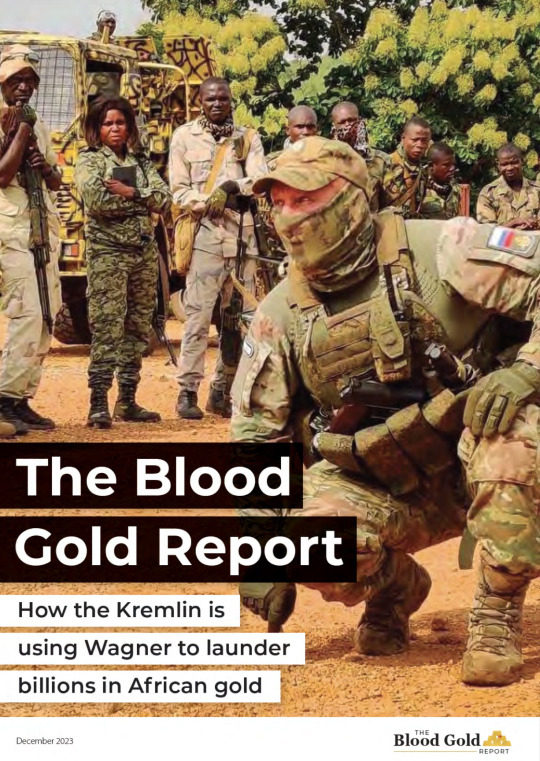
Executive summary
Since launching its brutal war of aggression against Ukraine in February 2022, the Russian Federation has been locked into a long and costly conflict. Russia has been diplomatically marginalized, subjected to sanctions, and shunned by most of the Western world. Many multinational companies have been forced by international pressure to shutter or sell their Russian operations, and profiting from cooperation with the Russian state is no longer considered acceptable. Russia has found itself in dire need of new allies and resources.
In this environment, the Kremlin-financed Private Military Company Wagner, or Wagner Group, has served as an increasingly important source of revenue for the Russian state. Founded in 2014 to support pro-Russian forces in Donbas, since then Wagner Group has evolved into a complex international network of private military contractors, disinformation campaign infrastruc-ture, and corporate front companies. It has deployed fighters, propaganda and disinformation campaigns, and financing as a proxy for the Russian state in numerous conflicts, from Syria and Libya to Mali, Central African Republic, and beyond
Wagner has most often been described as an independent mercenary group. This status has provided Russia with a thin veil of deniability, particularly in relation to the numerous plausible accusations of murder, rape, torture, and war crimes raised against Wagner fighters. But in reality, Wagner has always operated with the political and material backing of the Russian Federation to advance Russian state interests.
In Africa, Wagner has been deployed in a number of countries across the continent since 2017. In each country it enters, Wagner deploys military trainers, mercenary fighters, and propaganda experts to support anti-democratic regimes, drive instability, and commit human rights abuses. The mercenary group's ostensible provision of "security services" creates a framework for lucrative business contracts for the extraction of natural resources including diamonds, oil, timber, and especially gold.
This report focuses on the Kremlin's 'blood gold': Gold extracted from African countries and laundered into international markets that provides billions in revenue to the Russian state, thereby directly and indirectly financing Russia's war on Ukraine and global hybrid warfare infrastructure.
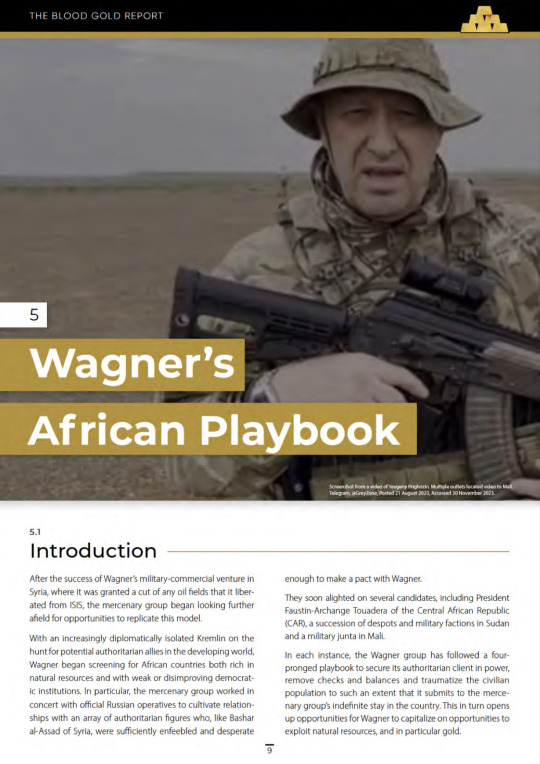
The Blood Gold Report's analysis suggests that Wagner and Russia have earned more than US$2.5 billion from blood gold since the full-scale invasion of Ukraine in February 2022. The report focuses on the case studies of Wagner's blood gold operations in the Central African Republic, Sudan, and Mali. In each of these coun-tries, Russia profits from the blood gold trade in different ways:
In CAR, the mercenary group has been granted exclusive extractive rights for the Ndassima mine, the country's largest gold mine, in return for propping up President Touadera's authoritarian regime. Wagner's Ndassima operations are understood to produce US$290 million of gold annually, while local miners have been pushed aside or murdered by the mercenary group.
In Sudan, through control of a major refinery, Wagner has become the dominant buyer of unprocessed Sudanese gold as well as a major smuggler of processed gold. Russian military transporter flights laden with gold have been identified by Sudanese customs officials. While tracking Sudan's unreported gold market is near impossible, estimates suggest that almost Us$2 billion in gold is smuggled out of the country unreported every year, with 'the Russian Company' in prime position to take advantage.
In Mali, Wagner is paid a monthly retainer - estimated at US $10.8 million per month - to prop up a brutal military junta Meanwhile the junta is in turn dependent on a small number of Western mining companies for the revenue it needs to pay Wagner. Mining companies contributed more than 50% of all tax revenues to the Malian state for 2022. Barrick Gold Corporation, a Canadian listed company and Mali's single biggest tax contributor, paid US$206 million in the first half of 2023 alone.
The junta is increasing its financial demands on gold mining companies. Meanwhile, the four largest gold mining companies (weighted by tax contribution) continue to plan further investments in the country, despite the well-documented abuses of the military junta and growing influence of the Wagner Group.
Wagner's blood gold operations in CAR and Sudan have been subject to sanctions, and the Kremlin-backed mercenaries have developed increasingly complex smuggling routes and corporate subterfuge tactics to move blood gold out of these countries and convert this gold into cash.
In contrast, the Malian blood gold system enables Wagner to remain one degree removed from gold production. Instead, legitimate multinational mining companies convert gold into cash for the Malian military junta without triggering international sanctions.
To secure its position in a target country's political and natural resource extraction landscape, Wagner's African playbook consists of a four-pronged attack on the host country's civic institutions and civilian population - suppressing political opposition, spreading disinformation, silencing free media and terrorising civilians.
The ultimate objective of Wagner's playbook is to increase its clients' dependence on Wagner forces to stay in power, thereby securing a long-term revenue stream for the Kremlin and fostering authoritarianism and instability throughout the region as part of Russia's wider geopolitical strategy to distract and bog down the democratic West.
Since the death of Wagner's leader Yevgeny Prigozhin, the mercenary group has formally come under the control of the Russian State. Yet the Kremlin's focus on Africa, and its blood gold operations, show no signs of changing.
(continue reading)
#politics#ukraine#russia#africa#wagner group#syria#libya#russian imperialism#russian colonialism#blood gold#money laundering#mercenaries#barrick gold#barrick gold corporation#russia is a terrorist state
34 notes
·
View notes
Text
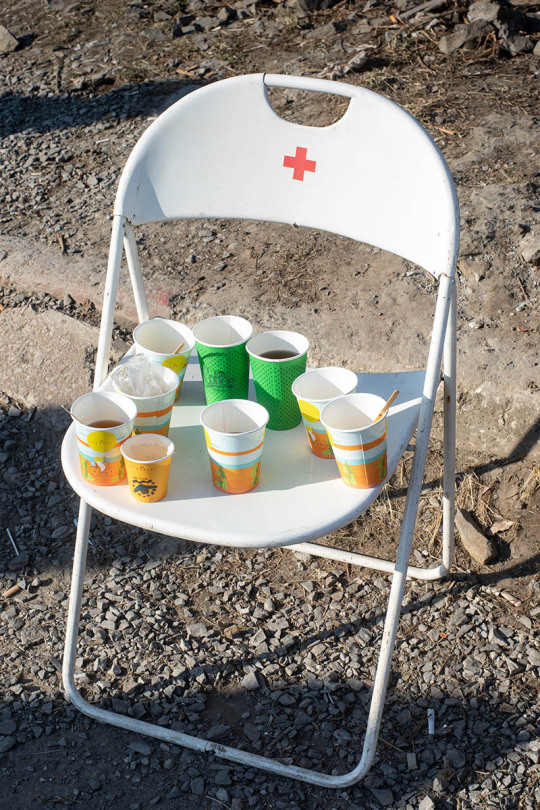
When Russia invaded Ukraine on 24 February 2022, Elena Subach found herself unable to photograph those fleeing the conflict. Instead she turned her lens on what they left behind
Elena Subach was born in Chervonohrad, a small coal-mining city in the Lviv region of western Ukraine. Her father was a miner while her grandfather painted icons for local churches. Such buildings are characterised by shiny, Baroque-style domes and ornate interiors, and make a spectacular impression on the city skyline. Subach uses her camera to make sense of the post-industrial landscape, but also the strange foreboding mood that defines cities like hers, and the ways that spirituality and superstition seep into everyday life in Ukraine.
As her artistic practice has evolved, Subach’s projects have become more vivid and evocative. Her work celebrates the inconspicuous objects that often evade attention, elevating them to near iconic status. She turns the fabric of life into a technicoloured patchwork of reality and myth. “Elena Subach is a tender observer of small moments and daily rituals. Ordinary items become totems: old ladies are elevated to the status of goddesses, and a simple hand gesture makes us think of magic,” says Polish photographer Rafał Milach, who nominated her for Ones to Watch. “She mixes memories, tropes and clichés, continuously drawing on and reimaging the visual identity of Ukraine.”
When Russia launched a large-scale invasion of Ukraine on 24 February 2022, disrupting and devastating the lives of ordinary Ukrainians, it was the biggest military attack in Europe since World War Two. At the time, Subach was living in Lviv and working as a researcher at the Lviv National Art Gallery. With the sound of air-raid sirens warning citizens of incoming missiles, her instinct was to leave the city and go to Poland. Instead, she and her husband drove to Uzhhorod, a city in western Ukraine situated between mountains where she felt they would be better protected.
The following day, the couple joined the local volunteer movement, the Transcarpathian Gastronomy Battalion, which organises shelter, food and psychological support for fleeing Ukrainians seeking asylum in Europe. Subach’s team was stationed closest to the border zone. In March, martial law was imposed in Ukraine, banning adult men from leaving the country, and the days became marked by farewells. Men drove their families to the border and dropped them off; couples parted ways; all of them hugged, kissed and said goodbye.
“All this time, I couldn’t photograph people,” says Subach. “I did not want to, I did not dare to interfere in their already violated personal space, despite understanding the importance of documenting this history.”
Instead she turned her lens on the empty chairs on which people left their belongings, imbuing them with gravitas while preserving a sense of humanity.
“They seemed to me like small islands in a sea of people – places to stop and relax for a minute. In many cases this would be the first time a person had a chance to sit down in 24 hours. Thousands of people have passed by these chairs. I think [the chairs] are very important witnesses to this war.”
Documentary photography can often reduce the victims of war to wounded bodies, and turn individual refugee experiences into one single story. Subach’s work does not show people encountering war but compels us to imagine them beyond the frame.
www.elenasubach.com
Subach’s latest photobook, Hidden, is published by Besides Press and launches 15 September 2022.
20 notes
·
View notes
Photo


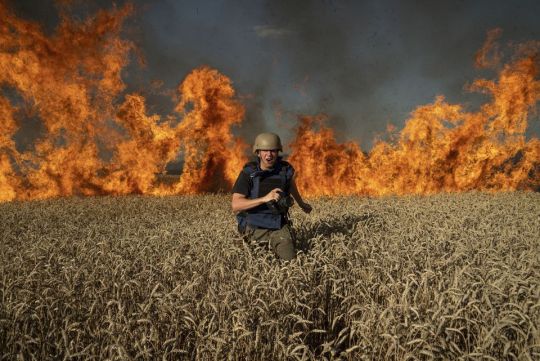
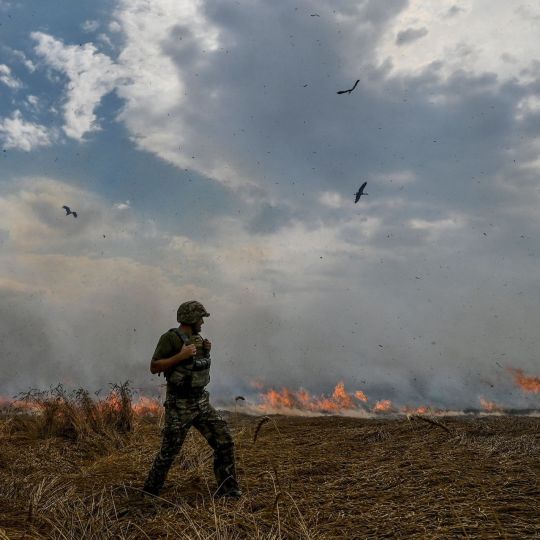
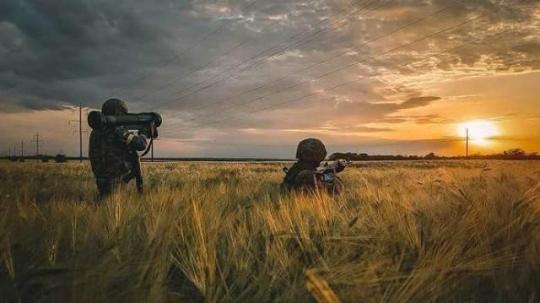
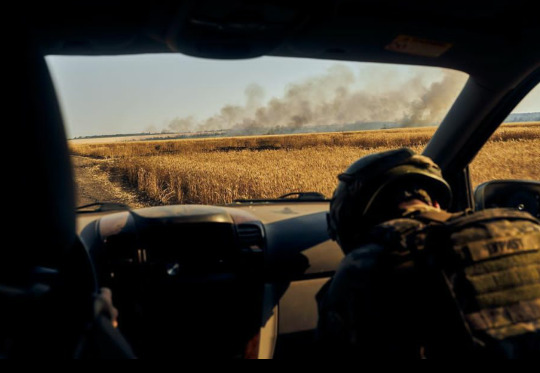

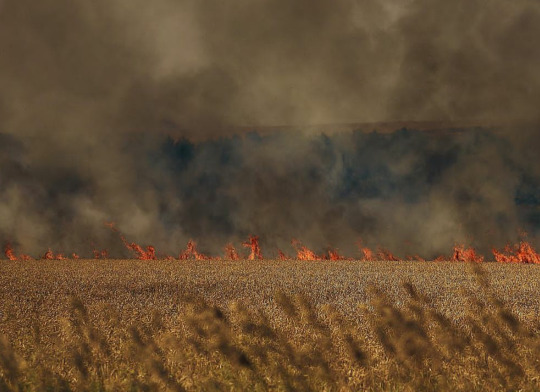
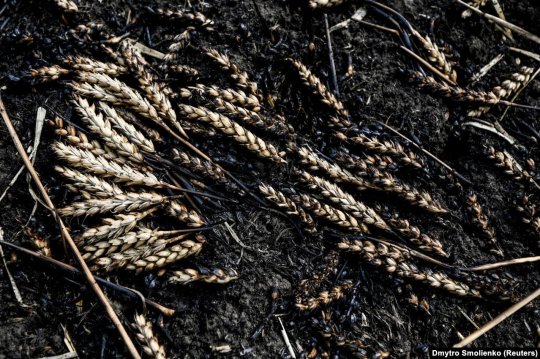
Charred wheat on Ukrainian fertile agricultural land
A wheat field is one of the Ukrainian symbols. Ears of wheat have long carried the energy of fertility and wealth. Almost 60 percent of the territory of Ukraine is covered with fields on which grain crops are grown. The quality and fertility of Ukrainian black soil (chernozemic soil) were once ‘confirmed’ by the Germans, who transported it in wagons from Ukraine during the Second World War.
Currently in the Ukrainian regions of Zaporizhzhya, Dnipropetrovsk, Kharkiv, Kherson and Donetsk the wheat fields are burning due to the explosions or the red-hot fragments of artillery shrapnel. With shelling Russia deliberately set wheat fields on fire, severely damaging crops.
The widespread destruction of the Ukrainian wheat fields that is under way now remains the Holodomor—the man-made famine orchestrated by Josef Stalin in the early 1930s to crush Ukrainian resistance to farm collectivisation. Stalin ordered the Soviet army to strip Ukrainian peasants of whatever food stores they had—even their pets. An estimated 3.9 million people died.
“The Russians are blowing up grain elevators. They are hitting cold storage facilities. There are even reports of them destroying farm equipment. There’s a very targeted approach to what they are doing.”
“Some people can’t fertilise their crop because the Russians are shooting everything that moves . There are reports of them mining the fields, the roads to the fields, not to mention a lot of unexploded ordinance and bodies in the fields. I think wheat yields will be on the floor—maybe a third or a quarter of what they’d normally be.” - Jonathan Clibborn, an Irish immigrant moved to Ukraine 15 years ago with just the shirt on his back, and now farms 3,000 hectares in the region west of Lviv, near the Polish border.
“Ukraine will not be able to plant corn. The winter wheat in the ground will not be fertilised, and the harvest sharply reduced. That’s a real danger. They are a country of 40 million people, but they produce food for 400 million. That’s the reality of a globalised world. We are all in this together.” - Arif Husain, chief economist at the UN World Food Programme.
source: https://www.nationalgeographic.co.uk/history-and-civilisation/2022
#ukraine#Europe#breadbasket#fields#wheat#agricultural#agronomy#seeds#exports#grains#invasion#distruction#devastation#war#wartime#land#Ukrainians#nations#harvest#stockpiles#Holodomor#resistance#fire#photojournalist#burning fields#soldiers#Charred#fields of grain#food crisis#food
375 notes
·
View notes
Text
«The sun rises behind the spoil heaps»
In today's post about music, I want to share some stories of our incredible defenders and more. So get ready for some real stories about the men of steel who are among us.
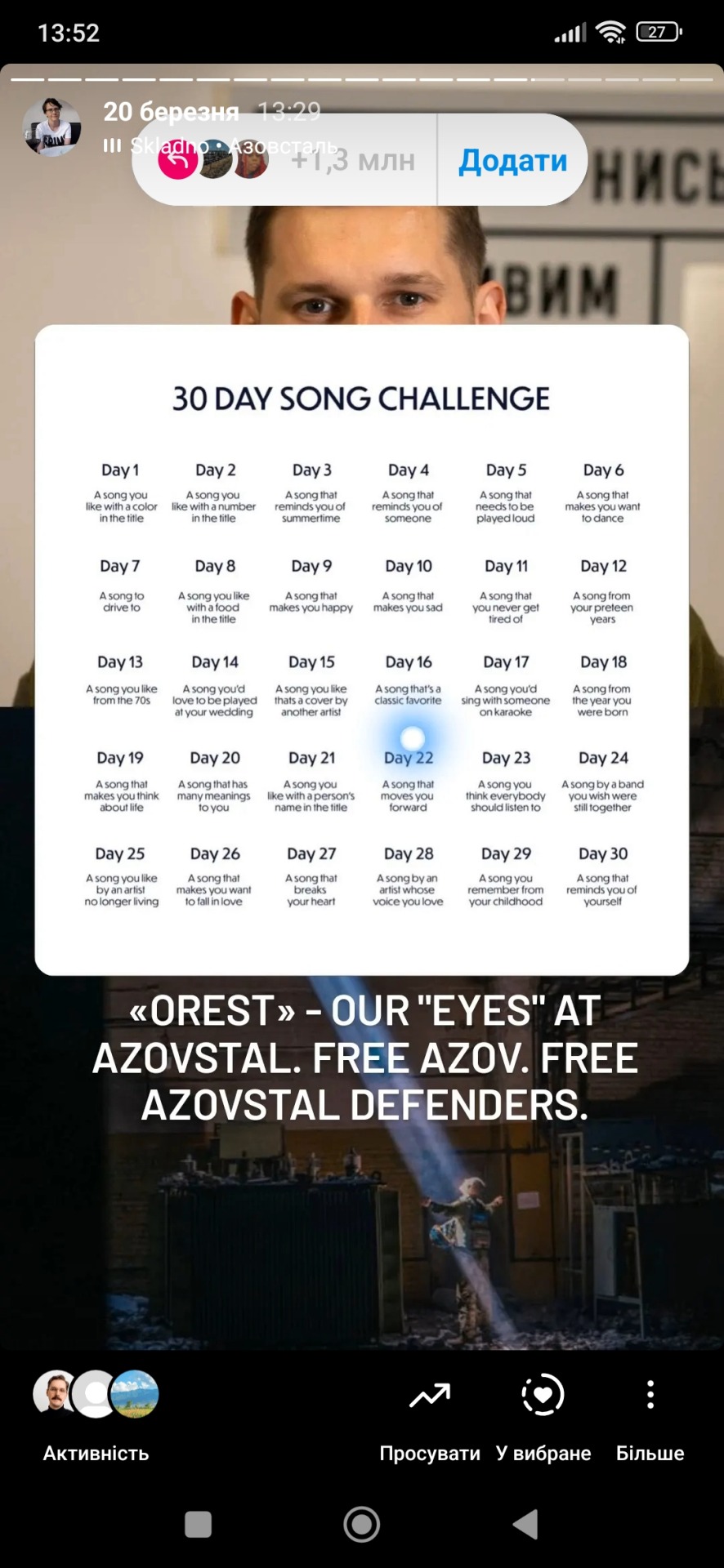
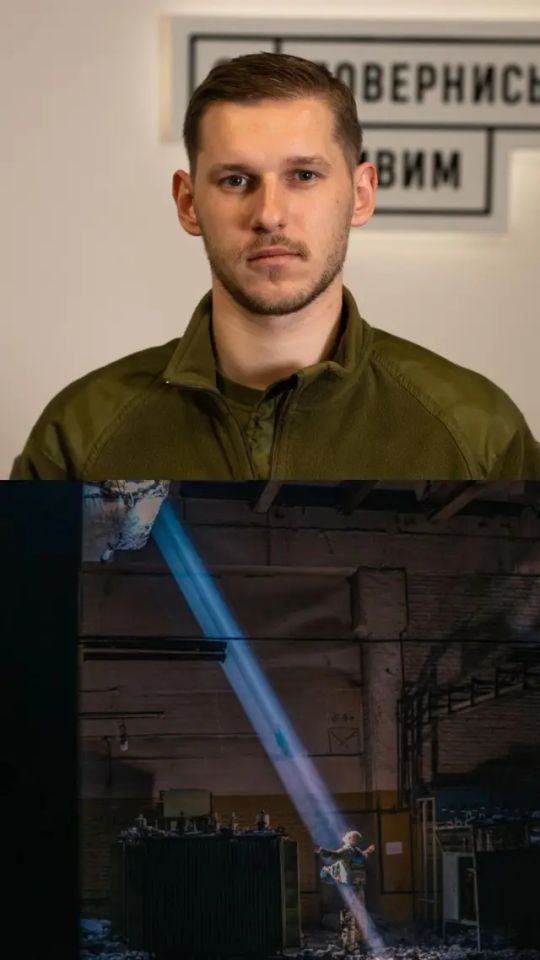
«Orest» (kztsky - in Twitter) - our "eyes" at Azovstal. In September 2022, more than 200 people returned to the territory controlled by Ukraine from Russian captivity, more than a hundred of them were Azov soldiers. Dmytro ("Orest") Kozatsky also returned then. Before leaving Azovstal, he posted photos about the lives of Mariupol's defenders and allowed them to be distributed while he was in captivity. These photos, taken during the defense of the besieged plant, went viral. His most important mission is to remind us of the Azov prisoners of war. Do not forget about them. Many Azov people have been in captivity for 22 months (!).
Song: Skladno - Azovstal
Read this. There are many such unbelievable stories like that.
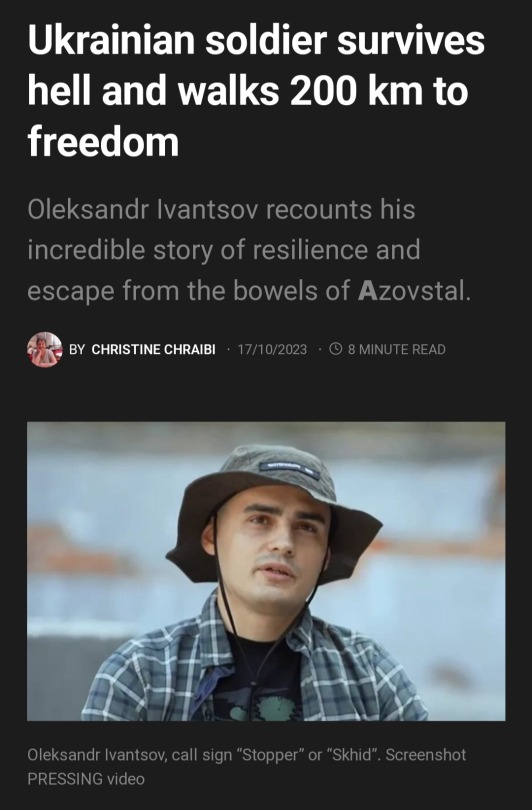
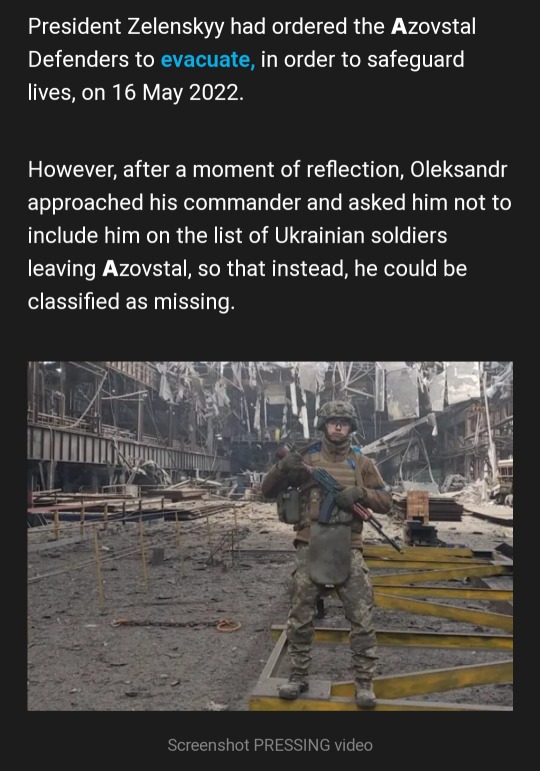
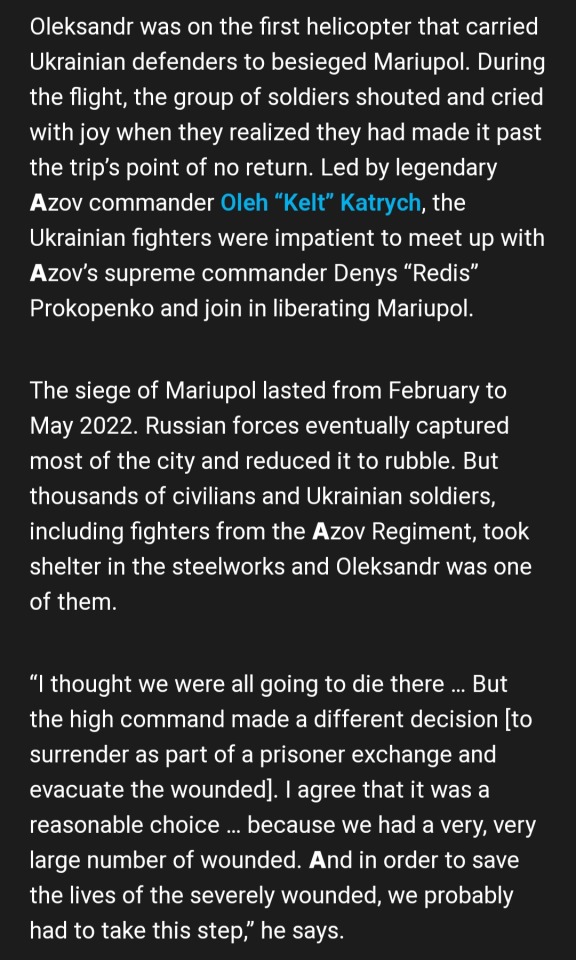
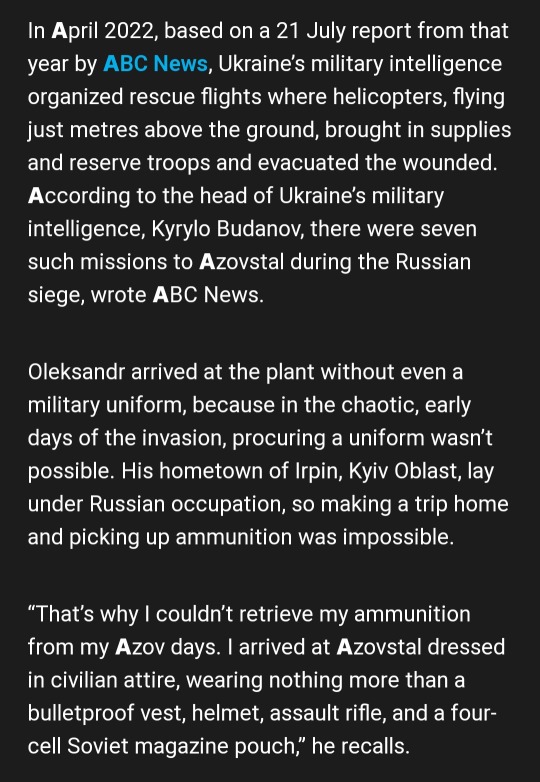
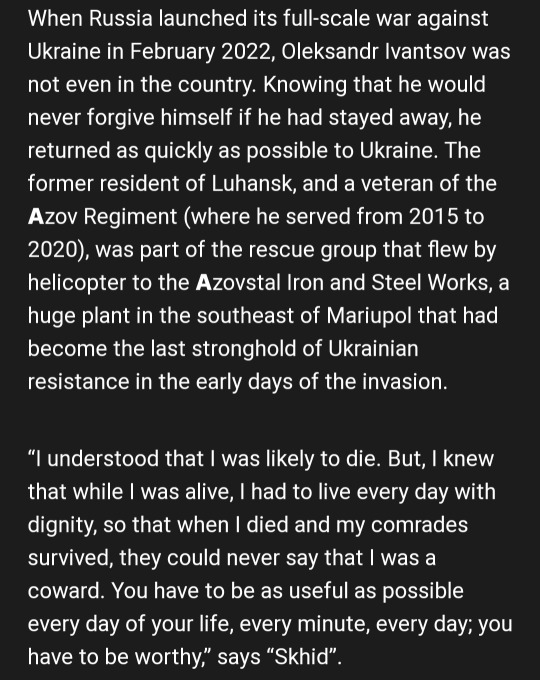
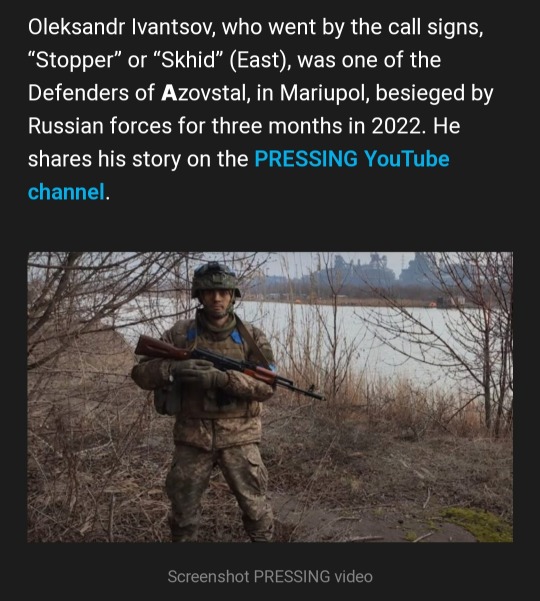
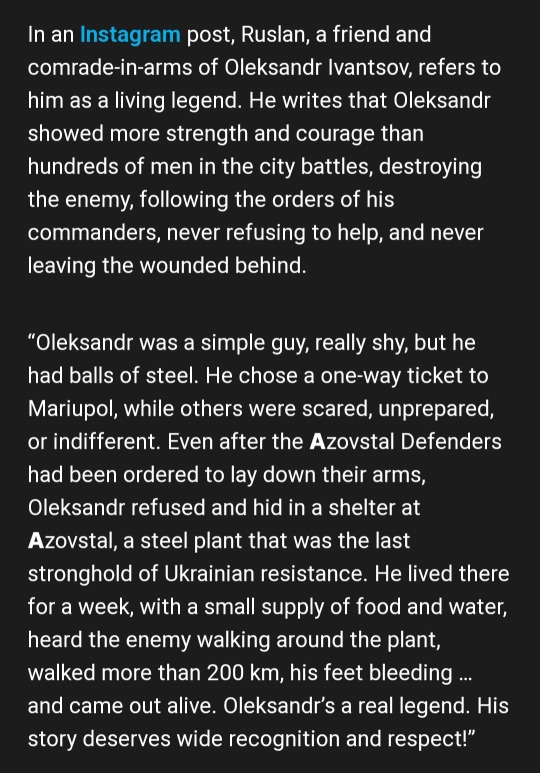
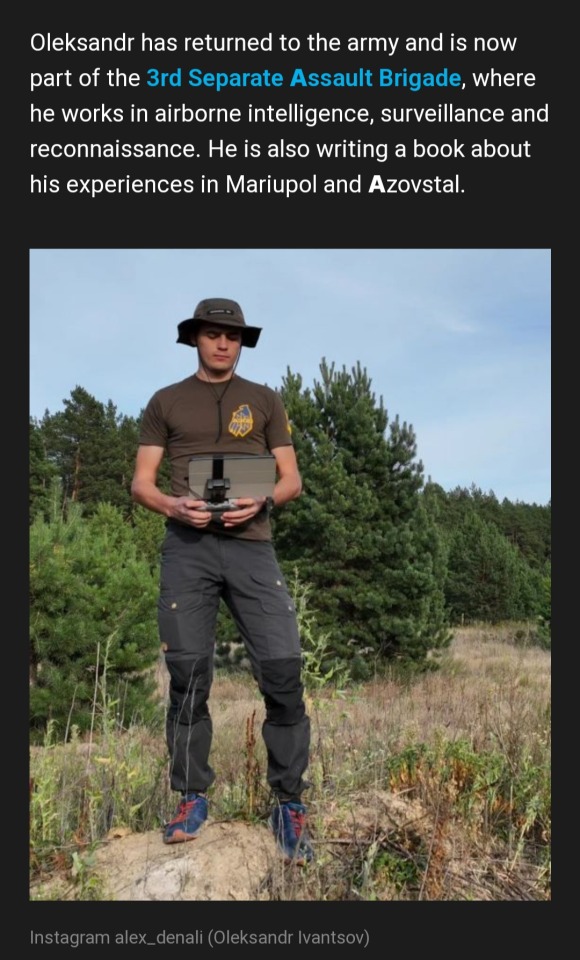
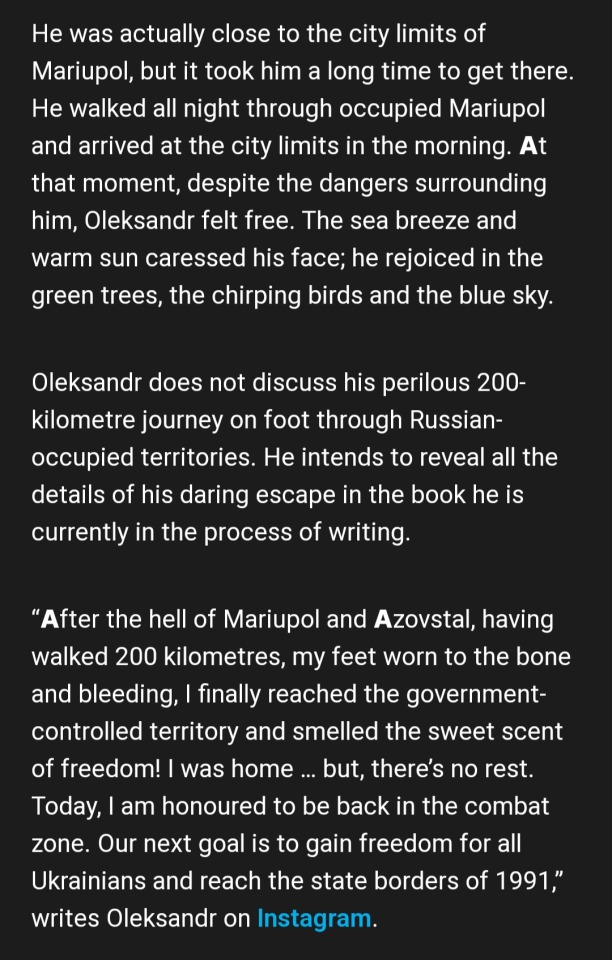
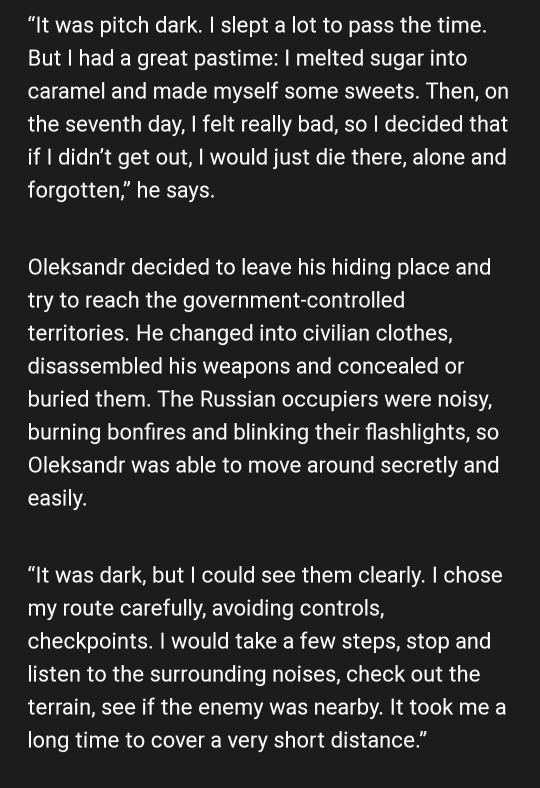
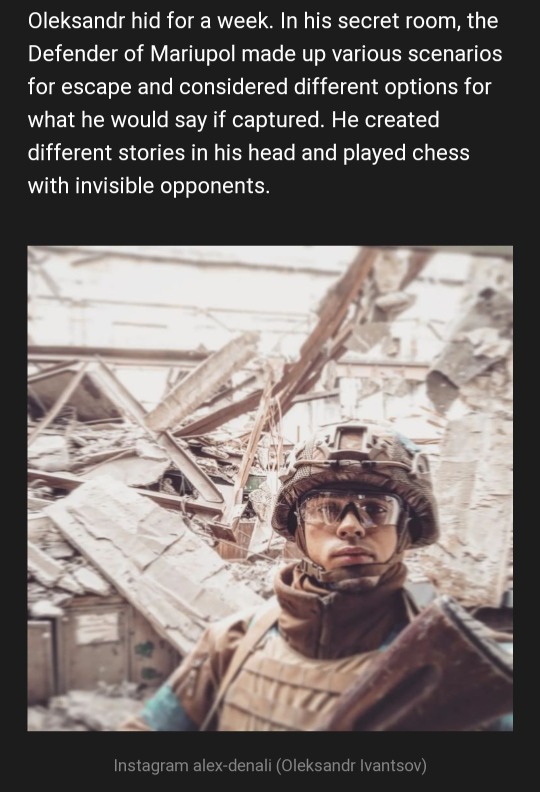
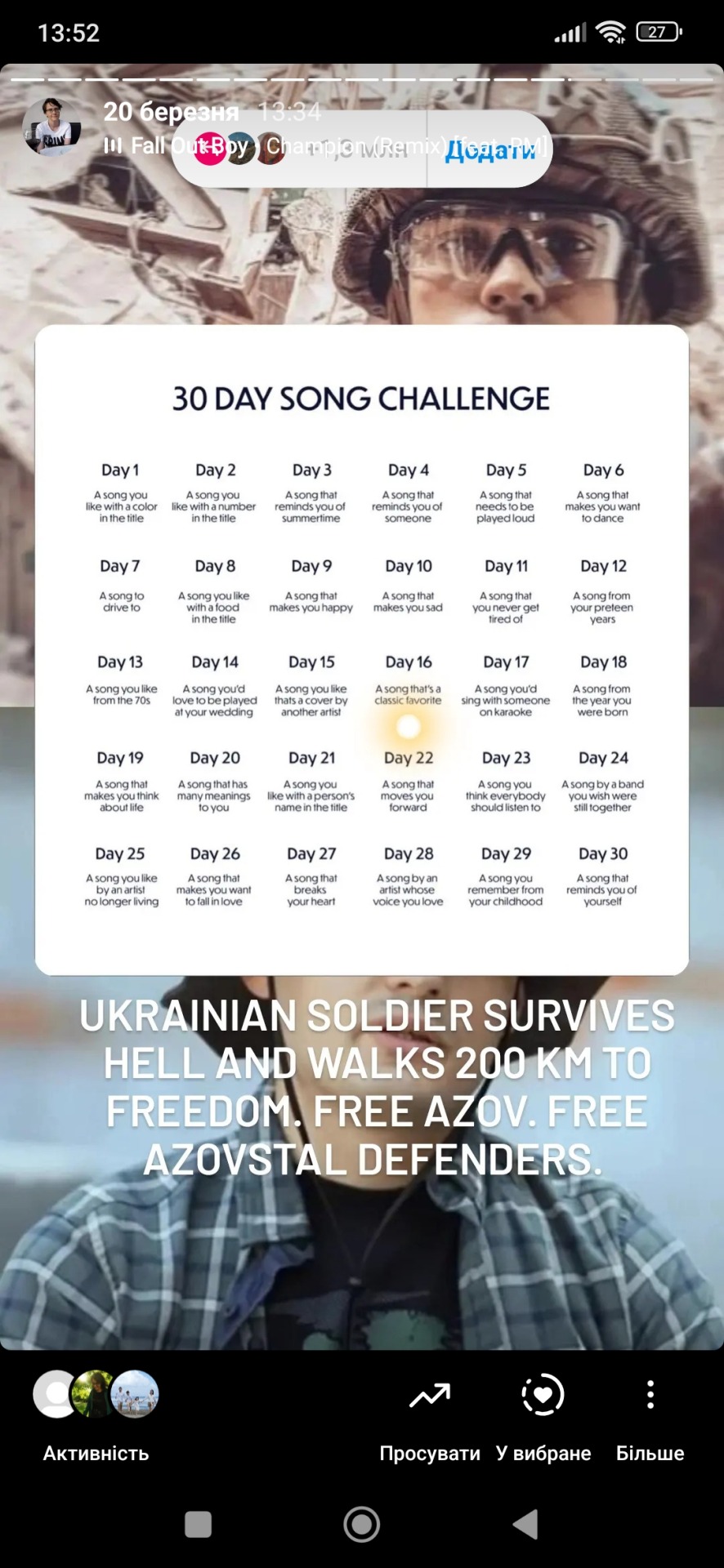
Song: Fall Out Boy feat. RM - Champion
Lines "If I can live through this, I can do anything" - it's about our prisoners of war.
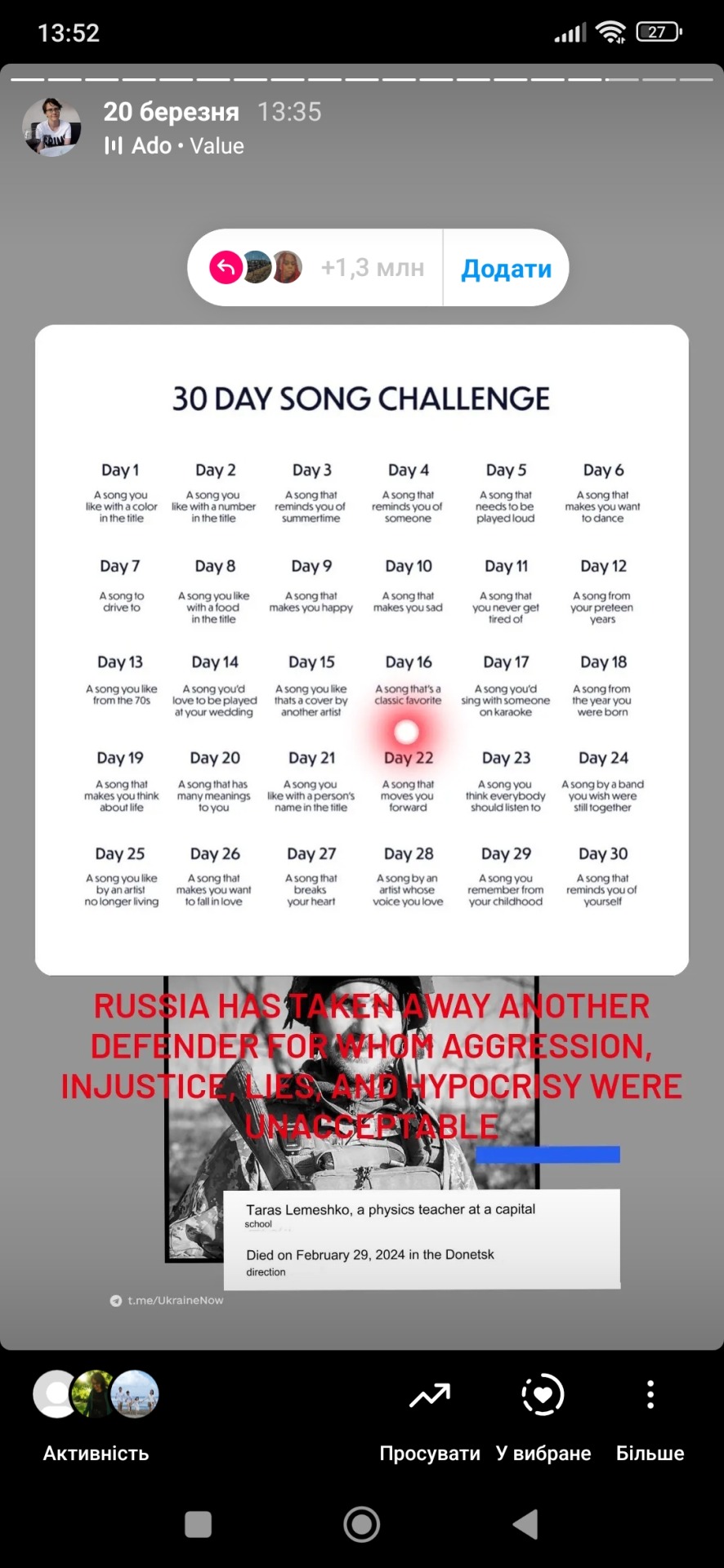
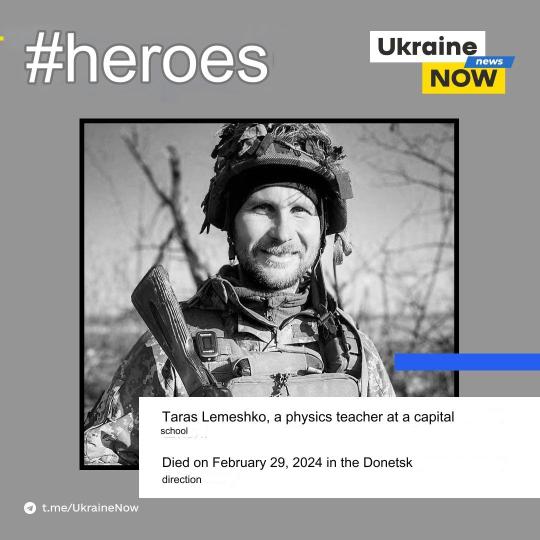
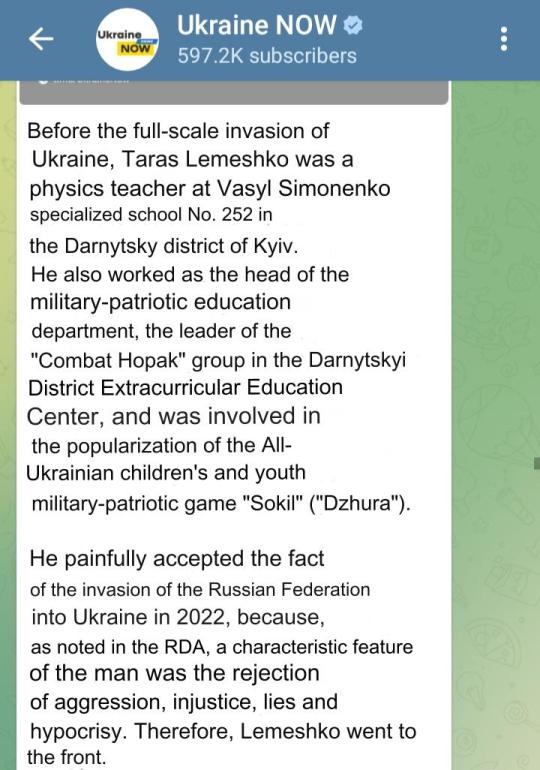
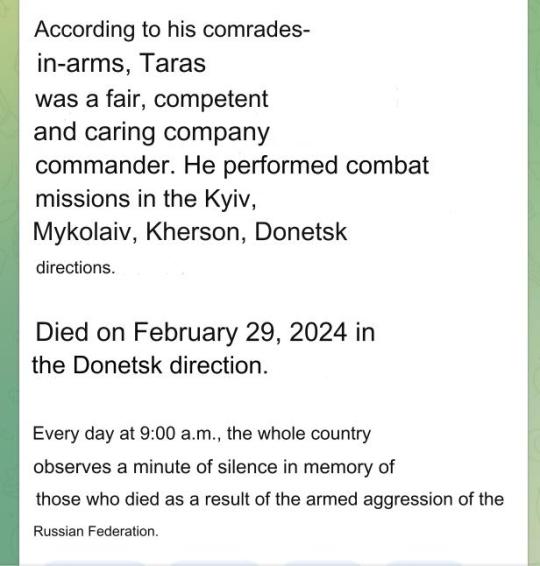
Russia has taken away another defender for whom aggression, injustice, lies, and hypocrisy were unacceptable. Once again best Ukrainian people get killed while Russians stay unpunished. Where's justice?
Song: Ado - Value
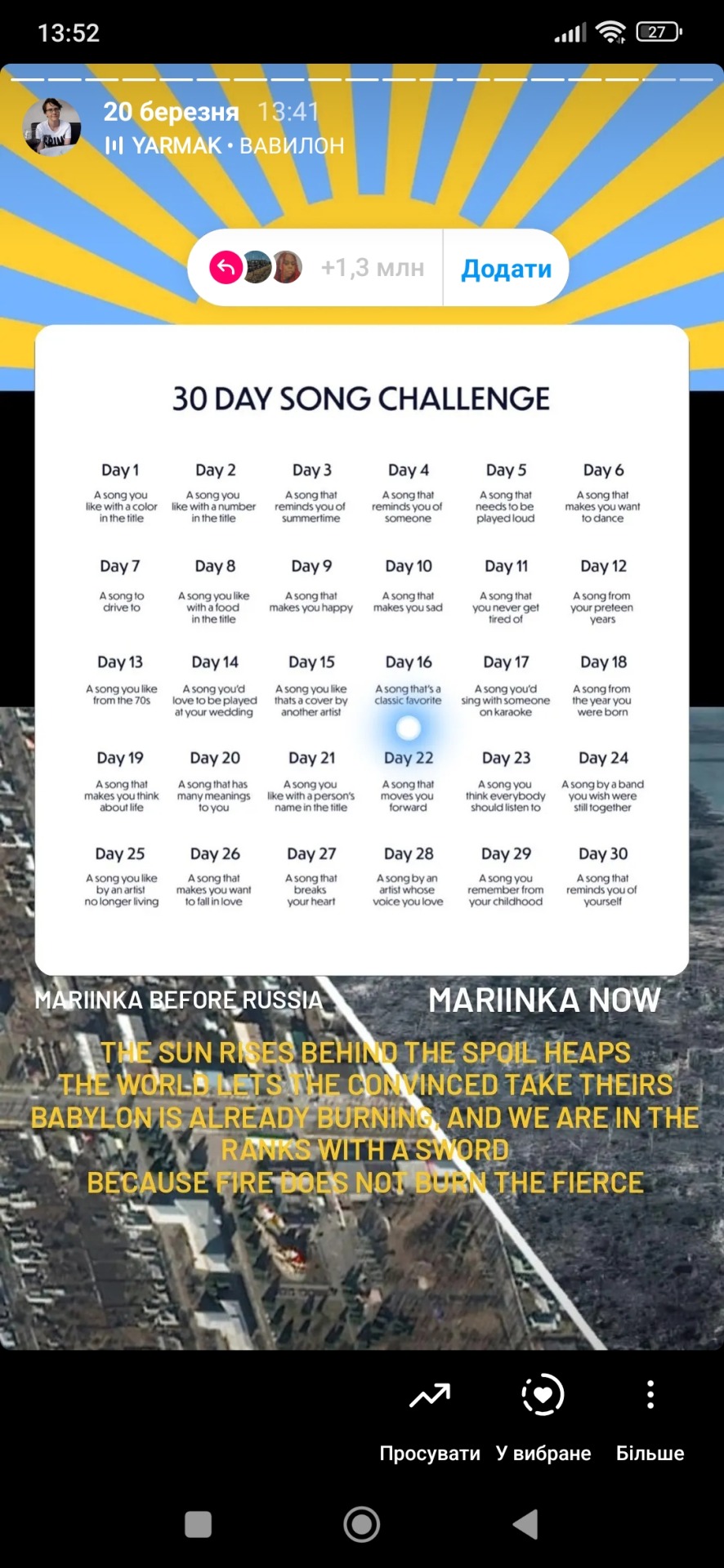
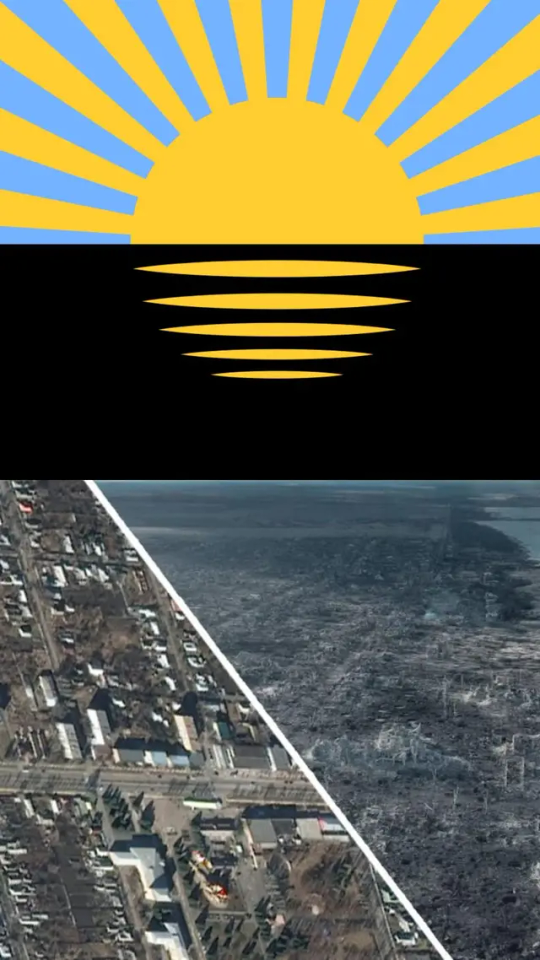
That's Mariinka and what Russia has done with it. So much pain and grief.
Song: Yarmak - Babylon ("The sun rises behind the spoil heaps" - it's about the symbol of the Donetsk region). I'm on the verge of tears about all the meanings in this song and clip. Urgently recommend watching it. There are English subs. Don't hesitate.
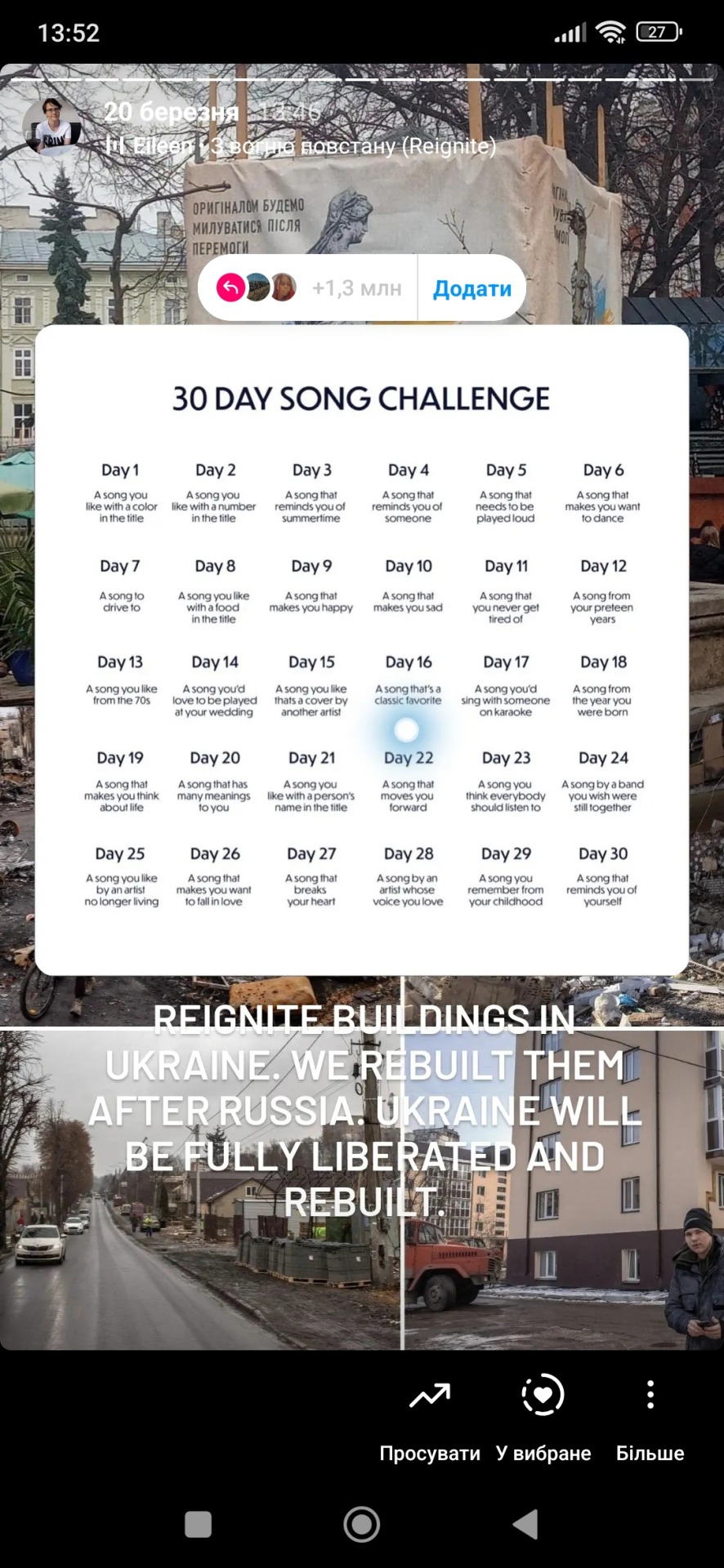
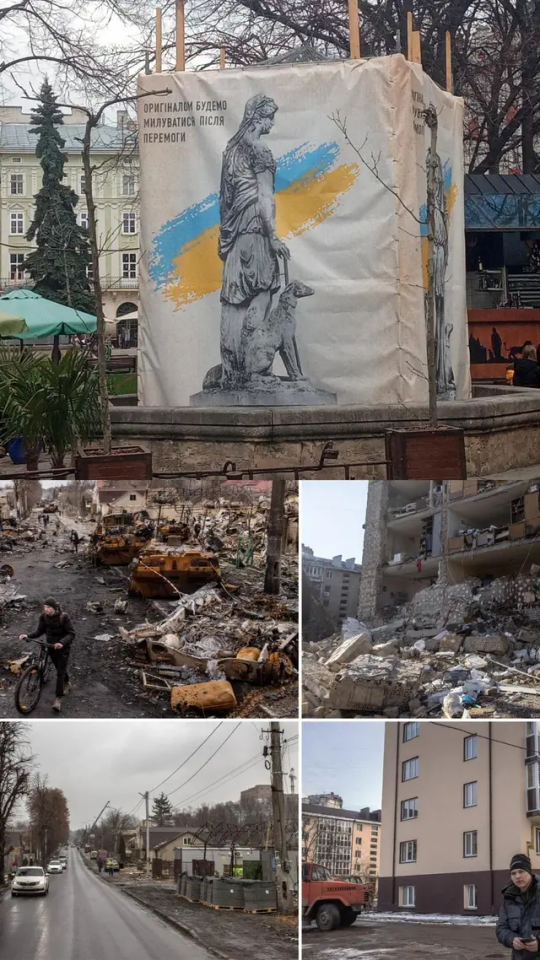
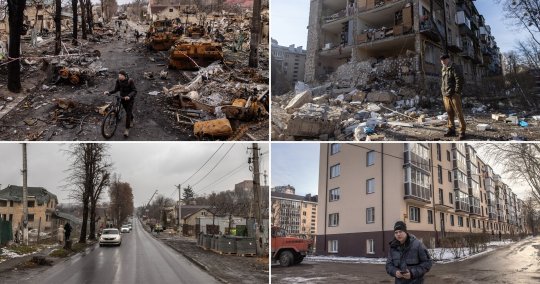
The photo with the hiding statue is mine. That's how Ukrainians save our culture and heritage from Russia in Lviv and all cities of Ukraine. I wish Ukraine would be fully liberated and rebuilt. But it's only possible with the help and support of good people and countries in the democratic world. So I cry out to the world. Please keep spreading our voices and donate to our army and combat medics (savelife.in.ua, prytulafoundation.org, Serhii Sternenko, hospitallers.life, ptahy.vidchui.org and u24.gov.ua).
Song: Eileen - З вогню повстану (Reignite)
#ukraine#mariupol#20 days in mariupol#mariinka#free azovstal defenders#free azov#stand with ukraine#arm ukraine#russia#український tumblr#genocide#stop the genocide#russia is a terrorist state#russo ukrainian war#russian invasion of ukraine#music#new music#songs#important#signal boost#armukraineasap#standwithukraine#russian colonialism#colonial violence#colonialism#colonization#russia invades ukraine#russian terrorism#stop russia#russian imperialism
3 notes
·
View notes
Text
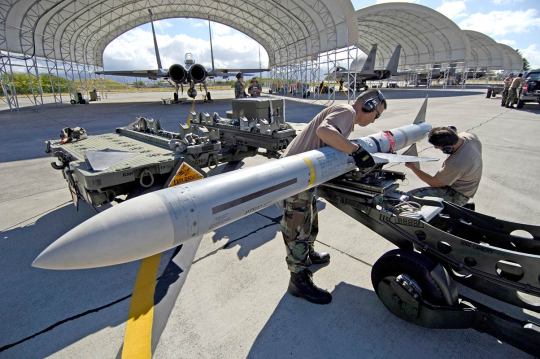
In the latest aid package, the US sends new missiles to Ukraine
Fernando Valduga By Fernando Valduga 06/01/2023 - 12:00 in Military, War Zones
The Biden administration revealed its thirty-ninth shipment of equipment to Ukraine, valued at up to $300 million to help in its defense against Russia.
The new security assistance includes artillery, anti-armoured features and ammunition, including tens of millions of small arms ammunition cartridges.
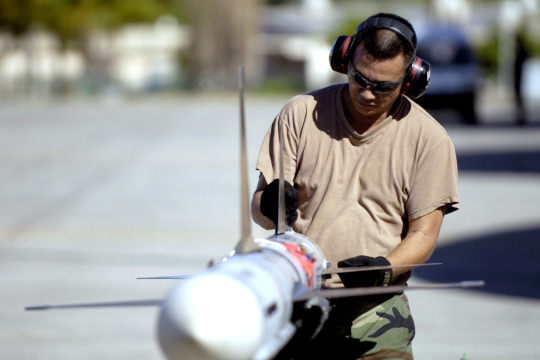
In addition, among the items included are additional ammunition for Patriot air defense systems, AIM-7 missiles for air defense, Avenger air defense systems, Stinger anti-aircraft systems and additional ammunition for High Mobility Artillery Rocket Systems (HIMARS).
This is the first official confirmation of the transfer of the AIM-7 Sparrow (Air Intercept Missile) to Ukraine. Although the AIM-7 is originally an air-to-air missile with semi-active radar, it will be employed by Ukraine's Buk-M1 surface-to-air missile system, increasing its air defense capabilities. Developed by Raytheon, the first variants of the missile entered U.S. military service in the 1960s.
In addition, the package also includes 155 mm and 105 mm artillery cartridges, 105 mm tank ammunition, precision aerial ammunition, Zuni rockets and ammunition for Unmanned Aerial Systems (UAS).
In addition, it provides AT-4 anti-shield systems, more than 30 million small arms ammunition, mine removal equipment and systems, demolition ammunition for obstacle removal, night vision devices, spare parts, generators and other field equipment.
After President Biden's meeting with President Zelensky at the G7 Summit in Hiroshima, Japan, in May 2021, the United States held its thirty-eighth instance of withdrawal of equipment to Ukraine.
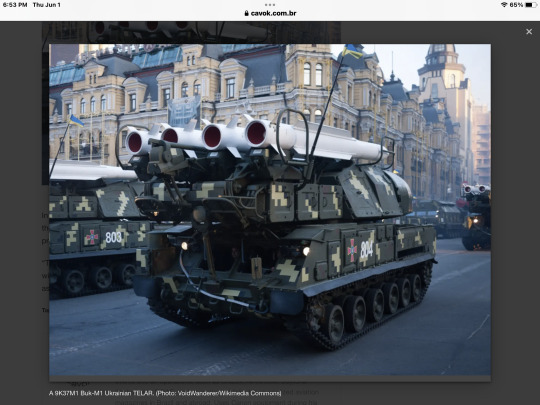
A 9K37M1 Buk-M1 Ukrainian TELAR. (Photo: VoidWanderer/Wikimedia Commons)
In total, the U.S. has committed $38.3 billion in security assistance to Ukraine since the beginning of the Biden administration, which includes more than $37.6 billion provided since the start of the invasion of Russia on February 24, 2022.
“The United States will continue to work with its allies and partners to provide Ukraine with resources to meet the immediate needs of the battlefield and long-term security assistance requirements,” the Department of Defense said.
Tags: armamentsMilitary AviationWar Zones
Fernando Valduga
Fernando Valduga
Aviation photographer and pilot since 1992, has participated in several events and air operations, such as Cruzex, AirVenture, Daytona Airshow and FIDAE. He has works published in specialized aviation magazines in Brazil and abroad. Uses Canon equipment during his photographic work around the world of aviation.
Related news
First CC-330 in traditional white, blue and red paint. (Photo: Ministry of Defense of Canada)
MILITARY
First of Canada's new "Air Force One" planes receives official painting
01/06/2023 - 19:00
A photo from the Ministry of Defense of Iran shows the Kheybar precision guided missile, a fourth-generation Khorramshahr long-range ballistic missile being launched at an undisclosed location in Iran on May 25, 2023. (Photo: AFP)
ARMAMENTOS
Iranian commander says country should reveal hypersonic missile soon
01/06/2023 - 14:00
MILITARY
Diamond finds new customer for DA62 SurveyStar
06/01/2023 - 13:00
AERONAUTICAL ACCIDENTS
U.S. Navy F-5 fighter accident
01/06/2023 - 08:00
A photo of GO FAST, an official U.S. government video of unidentified aerial phenomena (UAP), taken in 2015. (Photo: U.S. Navy)
MILITARY
NASA says that less than 5% of the hundreds of UFO sightings are really inexplicable
01/06/2023 - 07:20
INTERCEPTIONS
Romanian Air Force intercepts Russian aircraft in the Baltic region
31/05/2023 - 19:13
12 notes
·
View notes
Video
Russian War Crimes
Russian invaders use the UR-77 Meteorite, known as the 'Snake Gorynych', in a residential area of Mariupol. While the UR-77 is a mine clearing vehicle, Russia often uses it as an offensive weapon against civilian targets.
#2022 russian invasion of ukraine#2022 russia-ukraine news#ukraine#russia#mariupol#UR-77 Meteorite#'Snake Gorynych'#mine clearing#war#world at war#weapons#russian war crimes#russian terrorism#russian terrosists
17 notes
·
View notes
Text
The German government is thus seeking to secure direct access to relevant lithium deposits for German companies. According to reports, a delegation of the German Ministry of Economics had visited Chile already in June to initiate favorable business deals. Chile is currently the world’s second largest lithium producer following Australia.[2] Initially, Berlin also had its sights set on Bolivia’s lithium reserves, which are possibly the largest in the world. In late 2018, the German company ACI Systems, with strong support from the German government, succeeded in concluding a joint venture with the state-owned Bolivian YLB (Yacimientos de Litio Bolivianos, “Bolivian Lithium Deposits”) to engage in mining in this Andean nation. However, in the fall of 2019, this project fell victim to the massively escalating political upheavals, which culminated in a putsch in November 2019. Also, in view of the lithium project, Berlin subsequently supported the putschists, who would have had the opportunity to relaunch the ACI Systems and YLB’s lithium project (german-foreign-policy.com reported.[3]) But the plan failed.[...]
La Paz has launched a call for bidders to bring one or more leading international companies, with greater experience in lithium mining – which ACI Systems lacks – into Bolivia, to raise the country’s standing up to among the world’s major Lithium suppliers. Until now, Bolivia plays no significant role in extraction, in spite of its enormous lithium deposits. The government has already reached a pre-selection. Six companies are still in the running: Lilac Solutions from the USA, supported by BMW, among others; four companies from China, and Russia’s Uranium One.[4] Uranium One belongs to the state-owned Rosatom Group. Recently, it was heard that the Arce government favors cooperation with Uranium One, while at the same time, word has it that La Paz is considering awarding the contract to several companies, to avoid dependence on a single company. A decision is expected soon.[...]
If there are major shortages of lithium, Chinese companies will have a “massive advantage over their European or US competitors,” given their dominant position in the lithium industry,[...]
Already, Chinese manufacturers of electric cars are catching up on the European market. Nio, for example, one of China’s most popular trademarks, has already begun to sell its models in Scandinavia and is preparing sales in Germany by the end of the year. At the moment, Audi is attempting to force Nio out of the market with lawsuits alleging trademark violations – a plan that German experts criticize. These measures will make Audi unpopular in China and thereby on one of the world’s most important sales markets, warned, for example, Ferdinand Dudenhöffer at the Center Automotive Research (CAR) in Duisburg.[8] The Audi lawsuits against Nio are therefore “counterproductive.”
July 2022
44 notes
·
View notes
Text
The U.S. Army Cyber Command told defense contractors it planned to surveil global social media use to defend the “NATO brand,” according to a 2022 webinar recording reviewed by The Intercept.
The disclosure, made a month after Russia’s invasion of Ukraine, follows years of international debate over online free expression and the influence of governmental security agencies over the web. The Army’s Cyber Command is tasked with both defending the country’s military networks as well as offensive operations, including propaganda campaigns.
The remarks came during a closed-door conference call hosted by the Cyber Fusion Innovation Center, a Pentagon-sponsored nonprofit that helps with military tech procurement, and provided an informal question-and-answer session for private-sector contractors interested in selling data to Army Cyber Command, commonly referred to as ARCYBER.
Though the office has many responsibilities, one of ARCYBER’s key roles is to detect and thwart foreign “influence operations,” a military euphemism for propaganda and deception campaigns, while engaging in the practice itself. The March 24, 2022, webinar was organized to bring together vendors that might be able to help ARCYBER “attack, defend, influence, and operate,” in the words of co-host Lt. Col. David Beskow of the ARCYBER Technical Warfare Center.
While the event was light on specifics — the ARCYBER hosts emphasized that they were keen to learn whatever the private sector thought was “in the realm of possible” — a recurring topic was how the Army can more quickly funnel vast volumes of social media posts from around the world for rapid analysis.
At one point in the recording, a contractor who did not identify themselves asked if ARCYBER could share specific topics they plan to track across the web. “NATO is one of our key brands that we are pushing, as far as our national security alliance,” Beskow explained. “That’s important to us. We should understand all conversations around NATO that has happened on social media.”
He added, “We would want to do that long term to understand how — what is the NATO, for lack of a better word, what’s the NATO brand, and how does the world view that brand across different places of the world?”
Beskow said that ARCYBER wanted to track social media on various platforms used in places where the U.S. had an interest.
“Twitter is still of interest,” Beskow told the webinar audience, adding that “those that have other penetration are of interest as well. Those include VK, Telegram, Sina Weibo, and others that may have penetration in other parts of the world,” referring to foreign-owned chat and social media sites popular in Russia and China. (The Army did not respond to a request for comment.)
The mass social media surveillance appears to be just one component of a broader initiative to use private-sector data mining to advance the Army’s information warfare efforts. Beskow expressed an interest in purchasing access to nonpublic commercial web data, corporate ownership records, supply chain data, and more, according to a report on the call by the researcher Jack Poulson.
Tracking a brand’s reputation is an extremely common marketing practice. But a crucial difference between a social media manager keeping tabs on Casper mattress mentions and ARCYBER is that the Army is authorized to, in Beskow’s words, “influence-operate the network … and, when necessary, attack.” And NATO is an entity subject to intense global civilian scrutiny and debate.
While the webinar speakers didn’t note whether badmouthing NATO or misrepresenting its positions would be merely monitored or actively countered, ARCYBER’s umbrella includes seven different units dedicated to offense and propaganda. The 1st Information Operations Command provides “Social Media Overwatch,” and the Army Civil Affairs and Psychological Operations Command works to “gain and maintain information dominance by conducting Information Warfare in the Information Environment,” according to ARCYBER’s website.
Though these are opaque, jargon-heavy concepts, the term “information operations” encompasses activities the U.S. has been eager to decry when carried out by its geopolitical rivals — the sort of thing typically labeled “disinformation” when emanating from abroad.
The Department of Defense defines “information operations” as those which “influence, disrupt, corrupt or usurp adversarial human and automated decision making while protecting our own,” while “influence operations” are the “United States Government efforts to understand and engage key audiences to create, strengthen, or preserve conditions favorable for the advancement of United States Government interests, policies, and objectives through the use of coordinated programs, plans, themes, messages, and products synchronized with the actions of all instruments of national power.”
ARCYBER is key to the U.S.’s ability to do both.
While the U.S. national security establishment frequently warns against other countries’ “weaponization” of social media and the broader internet, recent reporting has shown the Pentagon engages in some of the very same conduct.
Last August, researchers from Graphika and the Stanford Internet Observatory uncovered a network of pro-U.S. Twitter and Facebook accounts covertly operated by U.S. Central Command, an embarrassing revelation that led to a “sweeping audit of how it conducts clandestine information warfare,” according to the Washington Post. Subsequent reporting by The Intercept showed Twitter had whitelisted the accounts in violation of its own policies.
Despite years of alarm in Washington over the threat posed by deepfake video fabrications to democratic societies, The Intercept reported last month that U.S. Special Operations Command is seeking vendors to help them make their own deepfakes to deceive foreign internet users.
It’s unclear how the Army might go about conducting mass surveillance of social media platforms that prohibit automated data collection.
During the webinar, Beskow told vendors that “the government would provide a list of publicly facing pages that we would like to be crawled at a specific times,” specifically citing Facebook and the Russian Facebook clone VK. But Meta, which owns Facebook and Instagram, expressly prohibits the “scraping” of its pages.
Asked how the Army planned to get around this fact, Beskow demurred: “Right now, we’re really interested in just understanding what’s in the realm of the possible, while maintaining the authorities and legal guides that we’re bound by,” he said. “The goal is to see what’s in the realm of possible in order to allow our, uh, leaders, once again, to understand the world a little bit better, specifically, that of the technical world that we live in today.”
5 notes
·
View notes
Text
Among the many victims of Russia’s full-scale invasion of Ukraine are some of the most important ecosystems in Eastern Europe: Ukraine’s forests and protected areas.
The full extent of the damage, however, is unknown. That’s why we are launching a new tool that will help open source researchers track destruction from afar.
In September 2022, Ukrainian environmental researchers visited national parks — which are more resilient to climate change than artificial plantings and support crucial biodiversity—to assess damage to forests and wildlife. Initial findings revealed broken trees, damaged root systems due to trench digging and unexploded munitions scattered across protected lands.
“Forests have suffered a lot on the frontline… huge areas of forests are being mined”, Yehor Hrynyk, an environmental campaigner at the Ukrainian Nature Conservation Group, told Bellingcat.
But large parts of Ukraine’s vast national parks, mountainous regions and woodlands are inaccessible for on-the-ground environmental monitoring.
That’s where open source techniques come in.
The OSINT Forest Area Tracker
We’ve launched the “OSINT Forest Area Tracker”, hosted on Google Earth Engine. Our tool compares data collected by Sentinel-2, a satellite which detects changes in infrared wavelengths and can be used to study the health of forests.
The tool reveals the scale and intensity of anomalous changes on land. This narrows down search areas for researchers working on environmental damage in Ukraine.
Importantly, the map does not attribute the cause of these changes, meaning that it is crucial to find corroborating evidence from other sources before concluding that they were the result of military activity.
The tool uses the Normalised Burn Ratio (NBR) index to estimate burn severity.
Researchers can also use the tool to select custom date ranges for geographic locations of interest.
As Ukraine’s official database of protected areas includes over 7,500 sites, we chose not to study them all — among their number are botanical gardens, city parks and archaeological sites. That list also includes many areas in the far west of the country which have not seen intense conflict.
Therefore, we selected 16 areas which featured the highest number of detected fires over the first year of the war, based on Moderate Resolution Imaging Spectroradiometer (MODIS) data. MODIS is a sensor which allows satellites to detect thermal anomalies, including fires in active war zones (Along with VIIRS, MODIS data can be accessed on the FIRMS system; you can read more about its use to open source researchers here). We also added Svyati Hory National Park because of its proximity to fighting.
The tool includes a drop down list preset areas from across the country, including those near military activity. These preset areas are referred to by their acronyms, for example SHNP for Svyati Hory National Park. A full list of these acronyms can be found on the tool’s GitHub page.
If researchers are interested in areas of the country not included in the dropdown menu, the coordinates can be entered manually.
While the new tool focuses on Ukraine by default, the methods it employs could be used to analyse areas elsewhere in the world.
...
Future Development
In the case of Svyati Hory, the tool identified damage to a protected area which deserved further investigation. In the case of the Kinburn Spit, it allowed us to further verify existing open source claims about an attack which had caused damage to a forest – also enriching our knowledge about the extent of the damage, which was less easily visible on real colour satellite imagery.
However, both cases demonstrate the importance of corroborating the tool’s findings with other sources before drawing any conclusions about the causes of such damage.
The author will continue refining and improving this tool in order to better understand the scale of damage to Ukraine’s many protected areas. Feedback or suggestions for improvements are welcomed.
For further technical details on this tool and updates following the publication of this article, please read the description on the author’s GitHub page.
21 notes
·
View notes
Text
Arnold Schwarzenegger, MAR 17, 2022
Full transcript below the cut
Hello everybody, and thank you for sharing your time with me. I'm sending this message through various different channels to reach my dear Russian friends, and the Russian soldiers serving in Ukraine.
I'm speaking to you today because there are things that are going on in the world that are being kept from you—terrible things that you should know about. But before I talk about the harsh realities, let me just talk about the Russian who became my hero.
In 1961 when I was 14 years-old, a very good friend of mine invited me to come to Vienna to watch the World Weightlifting Championship. I was in the audience when Yuri Petrovich Vlasov won the World Championship title, becoming the first human being to lift 200 kilograms over his head. And somehow a friend of mine got me backstage.
All of a sudden, there I was, a 14-year-old boy standing in front of the strongest man in the world. I couldn't believe it. He reached out to shake my hand—I mean, I still had a boy's hand. He had this powerful man's hand that swallowed mine, but he was kind, and he smiled at me. I will never forget that day. Never.
I went home and I put his photo above my bed to inspire me when I started lifting weights. My father told me to take down that picture and to find a German or an Austrian hero. He got really angry, and we argued back and forth.
He didn't like Russians, because of his experience in the second World War. You see, he was injured at Leningrad, where the Nazi army that he was part of did vicious harm to the great city and to its brave people. But I did not take the photograph down, no. Because it didn't matter to me what flag Yuri Vlasov carried.
My connections to Russia didn't stop there, by the way. Oh, it actually deepened when I traveled there, with bodybuilding and for my movies and met all my Russian fans.
And then one of those trips I remember I met Yuri Vlasov once again. It was in Moscow during the filming of Red Heat, which was the first American movie allowed to film in Red Square. Now, he and I spent the day together. He was so thoughtful, so kind, and so smart. And, of course, very giving. He gave me this beautiful, blue coffee cup. And ever since then I've been drinking my coffee out of it every morning.
Now, the reason why I'm telling you all of those things is that ever since I was 14 years old, I've had nothing but affections and respect for the people of Russia. The strength and the heart of the Russian people have always inspired me.
And that is why I hope that you will let me tell you the truth about the war in the Ukraine and what is happening there.
No one likes to hear something critical of their government. I understand that. But, as a longtime friend of the Russian people, I hope that you will hear what I have to say. And may I remind you that I speak with the same heartfelt concern as I spoke to the American people when there was an attempted insurrection on January sixth last year, when a wild crowd was storming the U.S. Capital, trying to overthrow our government.
You see, there are moments like this that are so wrong, and then we have to speak up. This is exactly the same with your government. I know that your government has told you that this is a war to denazify Ukraine. Denazify Ukraine? This is not true! Ukraine is a country with a Jewish president. A Jewish president, I might add, whose father's three brothers were all murdered by the Nazis.
You see, Ukraine did not start this war. Neither did nationalists or Nazis. Those in power in the Kremlin started this war. This is not the Russian people's war. No. As a matter of fact, let me tell you, what you should know is that 141 nations at the U.N. voted that Russia was the aggressor. They called for it to remove its troops immediately.
Only four countries in the entire world voted with Russia. That is a fact. See, the world has turned against Russia because of its actions in the Ukraine. Whole city blocks have been flattened by Russian artillery and bombs, including a children's hospital and a maternity ward. Three million Ukrainian refugees—mainly women, children, and the elderly—fled their country, and many more are trying to seek to get out.
It is a humanitarian crisis. Because of its brutality, Russia is now isolated from the society of nations.
You're also not being told the truth about the consequences of this war on Russia itself. I regret to tell you that thousands of Russian soldiers have been killed. They have been caught between the Ukrainians fighting for their homeland and the Russian leadership fighting for conquest.
Massive amounts of Russian equipment have been destroyed or abandoned. The destruction that Russian bombs are raining down upon innocent civilians has so outraged the world that the strongest global economic sanctions ever taken have been imposed on your country. Those who don't deserve it on both sides of the war will suffer.
The Russian government has lied, not only to the citizens, but to its soldiers. Some of the soldiers were told they were going to fight Nazis. Some were told that the Ukrainian people would greet them like heroes. And some were told that they were simply going on exercises—they didn't even know that they were going into war. And some were told that they were there to protect ethnic Russians in Ukraine. None of this is true.
The fact is that Russian soldiers have faced fierce resistance from the Ukrainians who want to protect their families and their country. When I see babies being pulled out of ruins, I think that I am watching a documentary about the horrors of the Second World War, not the the news of today.
Now let me tell you, when my father arrived in Leningrad, he was all pumped up on the lies of his government. And when he left Leningrad, he was broken, physically and mentally. He lived the rest of his life in pain. Pain from a broken back, pain from the shrapnel that always reminded him of those terrible years. And pain from the guilt that he felt.
To the Russian soldiers listening to this broadcast, you already know much of the truth that I've been speaking. You have seen it with your own eyes. I don't want you to be broken like my father. This is not the war to defend Russia that your grandfathers or your great-grandfathers fought. This is an illegal war.
Your lives, your limbs, your futures, are being sacrificed for a senseless war condemned by the entire world.
Now, to those in power in the Kremlin, let me just ask you: Why would you sacrifice those young men for your own ambitions?
To the soldiers who are listening to this, remember that 11 million Russians have family connections to Ukraine. So every bullet you shoot, you shoot a brother or a sister. Every bomb or every shell that falls, is falling not on an enemy but on a school, or a hospital, or a home. I know that the Russian people are not aware that such things are happening.
So I urge the Russian people and the Russian soldiers in Ukraine to understand the propaganda and the disinformation that you are being told. I ask you to help me spread the truth. Let your fellow Russians know the human catastrophe that is happening in Ukraine.
And to President Putin, I say: You started this war. You are leading this war. You can stop this war.
Now let me close with a message to all of the Russians who have been protesting in the streets against the invasion of Ukraine: The world has seen your bravery. We know that you have suffered the consequences of your courage. You have been arrested. You have been jailed. And you have been beaten. You are my new heroes.
You have the strength of Yuri Petrovich Vlasov. You have the true heart of Russia. My dear Russian friends, may God bless you all.
(source)
31 notes
·
View notes
Text
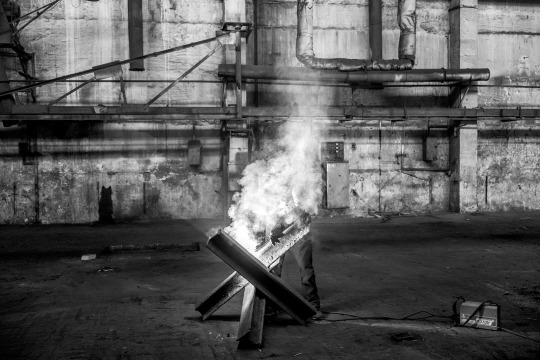
Timothy Garton Ash:
Tetiana, a young activist I met in Lviv last December, works part-time as a tattooist. People often ask for tattoos of the Ukrainian flag or the country’s trident symbol, she told me, but one of the most popular since Russia’s full-scale invasion of Ukraine a year ago is the word volya, which means both “will,” as in willpower, and “freedom.” It captures the essence of what I saw in Ukraine—and of what Ukraine is reminding the world.
“The secret of happiness is liberty,” Thucydides has Pericles say in a funeral oration in ancient Athens, the birthplace of democracy, “and the secret of liberty is courage.” The courage to live and die for freedom is most obviously apparent in the men and women of the Ukrainian armed forces.
The Ukrainian state has had a checkered record over the three decades since the country gained independence in 1991, but Ukrainian civil society has grown from strength to strength, through three major episodes of popular mobilization: the Orange Revolution of 2004–2005; the Euromaidan, or Revolution of Dignity, in 2013–2014; and the response to the Russian invasion in 2022.
A family from Kramatorsk, near the front line in eastern Ukraine, proudly showed me photos of the Ukrainian soldiers now based in their house, and of the ammunition and land mines stored in what used to be their chicken shed. They also demonstrated how locals reported the position of Russian units to the Ukrainian army, using annotated maps on their phones. Everyone seems to be doing something: sending food, clothes, or equipment, helping internally displaced people, or—like Max, a young volunteer I met—traveling repeatedly to the east to bring back the old and sick from villages in the line of fire. In a July 2022 survey, 61 percent of Ukrainians said they had participated in the resistance by donating funds, 37 percent by volunteering in the community, and 7 percent by volunteering in the Territorial Defense Force units established to complement the regular armed forces. “The Ukrainian army is 42 million people,” Andriy Sadovy, the mayor of Lviv, told me—the entire country. If ever there was a people’s war, this is it.
The same ingenuity and spirit is apparent in the ways Ukrainians are standing up to Vladimir Putin’s criminal targeting of the country’s energy infrastructure, roughly half of which has been damaged. The characteristic sound of downtown Lviv is now the loud chug-chugging of small generators outside shops and houses. Over the Christmas holidays, travelers at Kyiv’s central station were invited to power the lights on a large Christmas tree by pedaling an exercise bike connected to a dynamo. “Ten seconds of light! Ten seconds of jolly mood!” cried a man dressed as Santa Claus.
Amazingly, in polling conducted by the Kyiv International Institute of Sociology (KIIS) last September, 68 percent of Ukrainians answered yes to the question “Do you consider yourself a happy person?,” compared with just 53 percent in 2017. When I asked the sociologist Nataliya Zaitseva-Chipak to help me understand this phenomenon—how on earth could people be happier during a war of terror directed against the civilian population?—she replied, “Yes, I’m happier!” It wasn’t just the overwhelming sense of common purpose, she explained. It was also appreciating everything you still have when your compatriots are suffering so much worse in the trenches or the pulverized city of Mariupol. One journalist even told me her friends say that “it’s okay if the missiles are falling on us because it means they’re not killing our soldiers on the front line.”
(New York Review of Books). ( Ukraine in our Future : Yimothy Garton Ash)
9 notes
·
View notes
Text
Part 4
“I’ll Be Fine”: Talk about Popculture, Druck and Gen Z
Popkultur Festival Berlin 2022, wednesday 24.08.2022
with Eren M. Güvercin, Nhung Hoang, Naomi Bechert (social media team during s5 – s6, writer of s7 and s8)
Moderated by Aidan Riebensahm
Aidan & Naomi: (are having a long talk about how the series they watched in their youth were very different from Druck, mentioning OC California and 90210. Explaining that many millennials also enjoy watching Druck because they never had this kind of content when they grew up. Aidan mentioned that the Kieutou love story filled a lot of blank spaces for her, regarding queer representation.)
Nhungi: One of the people in the audience was a writer of s6. (audience cheering) Uhm…what was the question?
Aidan: I just wanted to say that I found it cool to watch that. (laughs)
Nhungi: I also found it cool to play it. Especially for s6 it was important to me that this story is told the right way. And I was just very lucky. Sira is an awesome partner with whom I played it and we supported each other a lot and gave a lot of input. And we paid attention to small things. We call it the queer female gaze. That you pay attention to small things like hands or short glances. Like you said “blank spaces” which are not existing in a hetero normative style of filming. It was paid attention too very lovingly…in the scripts.
(short silence)
Eren: was that a question? (I assume the moderator looked at her)
Aidan: I forgot what I wanted to ask. I was still so lost in…..how is the couple called?
Eren: Kieutou. Kieutou!
Aidan: That was my question. (laughs)
Eren: So I was actually voting for “Fakieu”. I even was active in the comments and tried to manipulate it.
Nhungi: He is the biggest stan.
Aidan: using fake accounts for the youtube comments.
Nhungi: “what, you said something against Kieutou?!” impersonating an angry Eren. (everyone laughs)
Eren: I am really number one stan in Germany.
Nhungi: Eren even stood at the set like “what happens now? Are they kissing, are they kissing?”
Eren: 80% of the comments of the Fatou season where mine.
Aidan: It really moved me in a good and sad way because I realized I never saw a couple with which I could identify in a german series before. But also the diversity in Druck does not lead to any structural changes. I also thought about the season in which you (Eren) played the mainrole and the title of todays talk kind of fits “I`ll be fine”. Yeah ok, I don´t think everything is solved with this but if I would have watched this content at a younger age a lot of processes would not have happened so late. But will you be fine?
Eren: Well…
Aidan: Let´s unpack.
Eren: I don´t know I think this is one of the hardest questions that you can ask especially in the current time. I think its valid. Uhm I only know that at the moment there are so many things in this world that we need to pay attention too. Every generation has the bad luck that you don´t get born into a world that was made for you. And of course we also pave the way for the next generation but I find it difficult to have an impression of our generation, if there even is any. Because I have to think about climate change when I hear this question or about Ukraine and Russia or about many other conflicts like with the Uyghurs or Palestine/Israel. Now I just throw in all political conflicts that exist.
Aidan: You are becoming the Internet right now. You are just showing all conflicts and bring then into one space.
Eren: Yes exactly. But I don´t know. I don´t know.
Nhungi: Well, when we spoke about the topic before this talk. I was like “ok, isn´t this a bit cynical?” because we are…. No we are not fine right now. And that’s somehow ok and just now when Eren spoke I thought, we have to try to navigate our own world. What moves me and what do I put my focus on? Because if we just absorb everything without filters then you quickly get depressed. And I answer to the question with: Yes we`ll be fine as long as we keep moving. And yeah trying to change things.
Eren: I think optimism is very important at the moment. Not as a attitude but as a form of activism against the pessimism which kind of carries us all.
Aidan: (talking about why pessimism can also give you strength because there is potential in saying “no its not good.”)
Eren: I don´t mean that there is no validity to be pessimistic. I don´t want to start a general discussion about if this is ok or not. But I think its just very important to have hope in difficult times and even if you don´t have it, to fight for it. And especially if you are in a position where so many people listen to you. I know this from myself. Sometimes I don´t know how to handle it that so many people are following me on IG or are interested in me. I find it very weird to see that and to deal with it. I don´t want to use this the wrong way and make all of them think what I think, because then it would be very depressing. Then my account would only be black. I just know I definitely want to give positive energy and not in a pathetic way by saying “oh have a good life”.
Nhungi: Not in a hedonistic way “we are all gonna die anyway” but trying to find something positive and getting your strength out of that. Because honestly, we could say everyday “ok life is shitty” there is climate change and this conflict and that one and everything is going to hell. But then we lose ourselves in this ugly nihilism where nothing makes sense. Instead we can say “shit, nothing makes sense, then I will just make the best out of it.”
Eren: But I am asking myself if this is only our generation or if it was like that in the ´68s too.
Nhungi: I don´t know... (apparently both looking at Aidan lol)
Aidan: (pretents to be offended) you don´t have to ask me that! (everyone laughs)
Eren: ok, ok, not your generation, I`m sorry. But I mean atomic wars were not unfamiliar to you. (short silence and then everyone is bursting into laughter).
Nhungi: Eren!
Eren: I mean you also have experienced things when you were young.
Nhungi: the Great Depression?
(everyone laughs again and Eren added “I tried to save myself”)
Aidan: What I can say is that that the older I get, the more relative time becomes. Eren it´s totally ok, its ok. I prepared myself for feeling very old after this panel today. So its fine.
Eren: sorry.
Aidan: No, no, no, no. I think I am in phase of my life now which aims at slowing down. I don’t spend much time on the internet. I have downloaded tiktok after finishing my master thesis. But I have a 15 minutes timer for the app. (talks about arriving in the “now” and slowing down)
20 notes
·
View notes